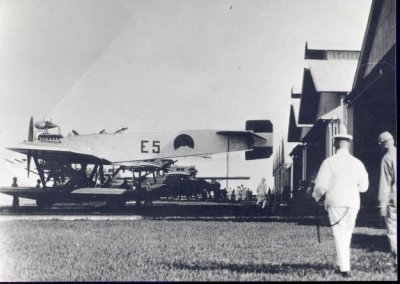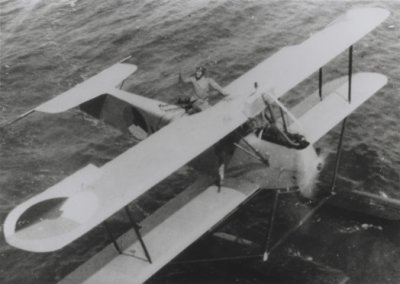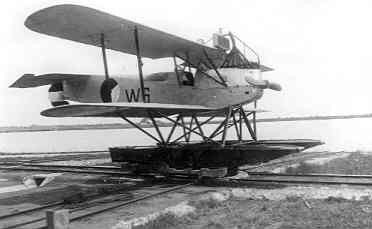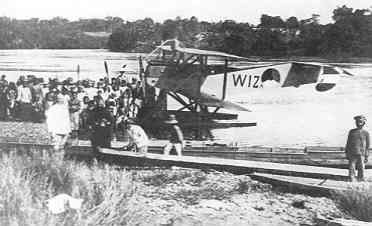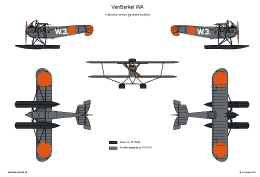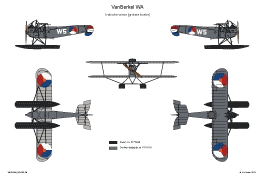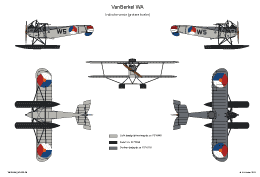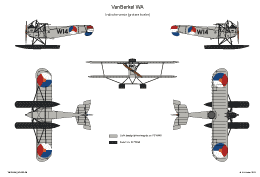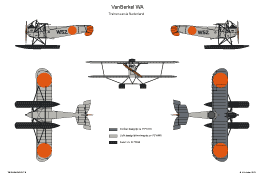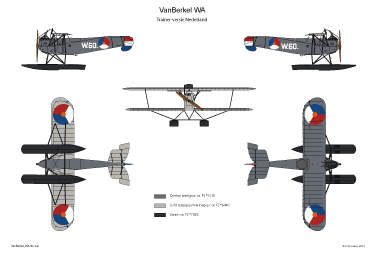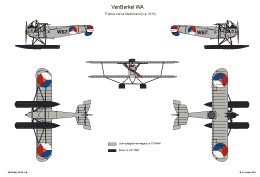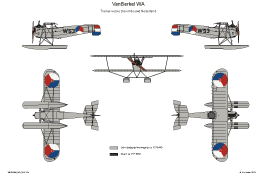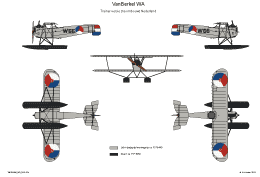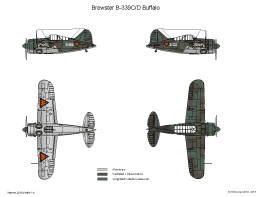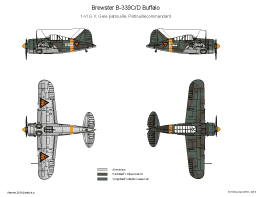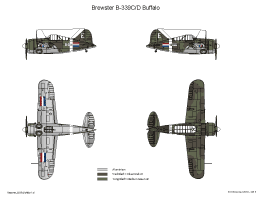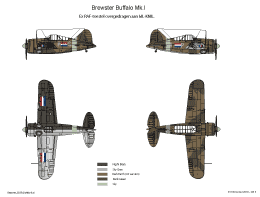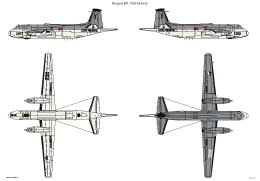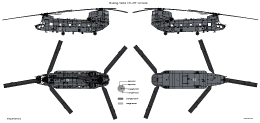- Details
- Hits: 9266
History
Van Berkel was commissioned in 1919 to develop a long-range sea scout. The design was based on the Hansa-Brandenburg W.29, an example of which had been interned.
The chief engineer of Van Berkel, ir Von Baumhauer changed de design severely. Van Berkel WB was larger than the W.29 and the engine was more powerful.
| Dimensions: | |||
| Length: | 9,35 m | Wingspan: | 13,55m |
| Height: | 3,55 m | Wing area: | 32,20m2 |
| Weights: | |||
| Empty weight: | 1050 kg | Max. start weight: | 1494 kg |
| Performances: | |||
| Max. speed: | 175 km/hr | Rate of climb: | |
| Cruising speed: | 140 km/hr | ||
| Range: | 1500 km | Service ceiling: | |
| Miscellaneous: | |||
| Engine type: | One Rolls Royce Eagle VIII rated 360 hp | ||
| Crew: | Two | ||
| Armament: | Two machine guns | ||
| Exact dimensions are not known. It is stated that this aircraft was developed from the Hansa-Brandenburg W.29, one of which was interned during World War One. Other sources state that it was merely a development from the larger Hansa-Brandenburg W.33 |
|||
In service with RNlNAS.
The MLD ordered seven examples for this type and the first aircraft made its first flight in 1920.
The delivery of other aircraft took place much later, the last example was transferred to the RNlNAS in 1923.
De VanBerkel WB was mainly used in the Dutch East Indies. The performance of the aircraft was disappointing, so in 1933 these aircraft were withdrawn from use.

[Enclosed photo from BeeldBank NIMH. Click on photo for ordering information]
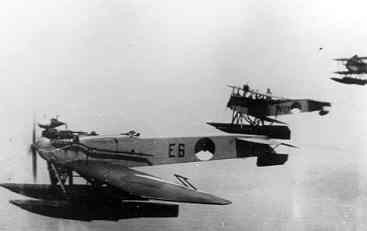
[Enclosed photo from BeeldBank NIMH. Click on photo for ordering information]
| Serial | Contr.nr. | Date in service | Date out of service | Notes |
|---|---|---|---|---|
| E-1 | 1921 | 1925 | Written off. | |
| E-2 | 1921 | 1925 | Written off. | |
| E-3 | 1921 | 1925 | Written off. | |
| E-4 | 1922 | 1925 | Written off. | |
| E-5 | 1922 | 1933 | Written off. | |
| E-6 | 1922 | 1933 | Written off. |
1/72nd Scale
It might be converted from a Hansa-Brandenburg W.29 though it was larger than this type or you may convert it from a W.33.
- Broplan
- Kit XX: A vacuformed kit of a Hansa-Brandenburg W.33 (Mercedes Engine).
Modelling add-on
- --
- Set --: --
Decals
- --
- Set --: --
1/48th Scale
Kits
- --
- Kit --: --
Modelling add-on
- --
- Set --: --.
Decals
- --
- Set --: ---.
.
| Scheme | Colour name | FS number | BS-number | Humbrol | XtraColor | Vallejo Model Color | Vallejo Model Air | |
|---|---|---|---|---|---|---|---|---|
| Delivery scheme | Undersides | Light Grey | 129 | X317 | 70.986 | |||
| Upper side fuselage, wing, etc. | Dark Grey | 92 | 70.830 | |||||
| Struts, floats etc | Black | ~7038 | 33 | 70.950 | ||||
| Colour scheme from 1925 and on | ||||||||
| Standard #2 | Overall | Light Sea grey | 129 | X317 | 70.986 | |||
Check www.paint4models.com for an extensive conversion table with lots of colour and paint systems.
Literature.
| Nederlandse Marinevliegtuigen | Thijs Postma & Nico Geldhof | Pag. 13 | 1978 | Uitgever Omniboek, 's Gravenhage |
| Zestig jaar Marineluchtvaartdienst in Beeld. | Hugo Hooftman | Pag. 19 - 20 | 1977 | Uitgever Europese Bibliotheek, Zaltbommel |
| 40 Jaar luchtvaart in Indië | Gerard Casius & Thijs Postma | Pag. 14 | 1986 | Uitgeverij De Alk, Alkmaar |
| Camouflage en Kentekens | J.Greuter e.a. | 1997 | Bonneville – Bergen (NH) | |
| Air Enthusiast no.80, The Historical Aviation Journal: Unexpected Windfalls | Bart van der Klaauw | pag. 54 - 59 | 1999 | Uitgever Key Publishing,Stamford |
Websites.
- Details
- Hits: 13847
History
The Van Berkel WA was a successful Dutch development of HansaBrandenburg W.12, of which an example was interned in April 1918.
Besides Trompenburg, there was no other aircraft manufacturer in the Netherlands at that time. The Navy requested, however to "Society for the manufacture of cutting machines, Van Berkel patents and other tools', or, in a shorter way, just 'Van Berkel",
to start the production of aircraft and aircraft engines.
'Van Berkel" had thus far been successfully produced several military orders. In October 918, a contract for the construction of 35 aircraft was received, initially as a license of the W.12.
However, several necessary adjustments to the original design were implemented, including the undercarriage was enlarged. In fact another design was developed, which was known as Van Berkel WA.
Another difference compared to the Hansa Brandenburg
W.12 that the ailerons in the wings were omitted.
The tubular steel construction of the undercarriage was covered with wood for streamline purposes.
The coolers of the NEI machines were also larger than those of the Netherlands-based machines. Sometimes, the coolers were tilted back.
The first
VanBerkel WA was completed in July 1919 and exhibited at the ELTA, (First Air Traffic Exhibition Amsterdam).
With this prototype, such extensive tests were done, that it didn't survive these tests.
| Dimensions: | |||
| Length: | 9,47 m | Wingspan: | 11,25 m |
| Height: | 3,23 m | Wing area: | 35,30 m2 |
| Weights: | |||
| Empty weight: | 997 kg | Max. start weight: | 1314 kg |
| Performances: | |||
| Max. speed: | 150 km/ | Rate of climb: | |
| Range: | Service ceiling: | ||
| Miscellaneous: | |||
| Engine type: | One Mercedes D-III rated 160 hp | ||
| Crew: | Two | ||
| Armament: | . | ||
| The aircraft was in many ways a copy of the HansaBransenburg W.12 with some modifications, such as larger struts for the floats. | |||
In service with RNlNAS.
The first production machine was transferred to the RNlNAS in September 1919.
Twenty of the thirty-five aircraft were intended for use in the Netherlands East Indies and received the registrations W.1 to W20.
The planes to be used in the Netherlands were registered W51 to W65. The registrations were not parallel with the construction numbers.
Technical Support is also built five machines from components supplied, these were the records W66 to W70.
The technical service of the RNlNAS had built several complete fuselages, which needed just to be mounted an applied with a serial of the original aircraft. To avoid problems with the license rights, also a few parts of the original device were added.
From October 1924 all remaining aircraft in the Netherlands had their fuselages replaced with a fuselage made of tubular steel instead of wood.
These fuselages were built at the Naval Air Station De Kooy, also the losses were compensated.
The
rudder was enlarged to improve some of the water manoeuvrability. Also, the engines were replaced by BMW III engine, the cooler on the wing leading edge was moved to the nose.
The wooden floats were replaced with aluminium ones.
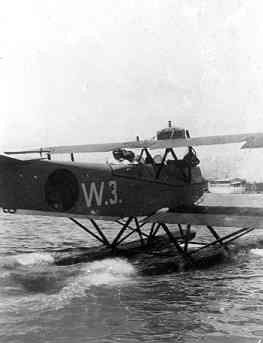
[Enclosed photo from BeeldBank NIMH. Click on photo for ordering information]
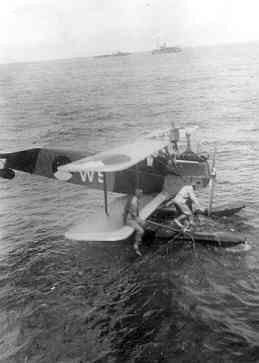
[Enclosed photo from BeeldBank NIMH. Click on photo for ordering information]

[Enclosed photo from BeeldBank NIMH. Click on photo for ordering information]
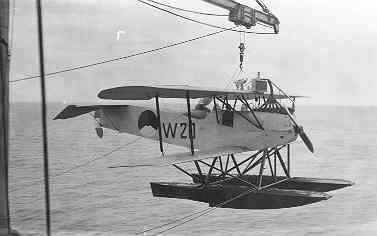
[Enclosed photo from BeeldBank NIMH. Click on photo for ordering information]
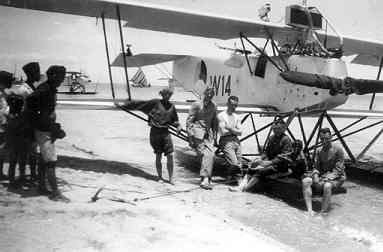
[Enclosed photo from BeeldBank NIMH. Click on photo for ordering information]
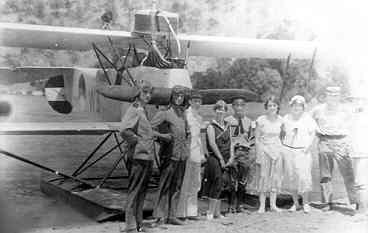
[Enclosed photo from BeeldBank NIMH. Click on photo for ordering information]

[Enclosed photo from BeeldBank NIMH. Click on photo for ordering information]
Note the orange ball as national marking.
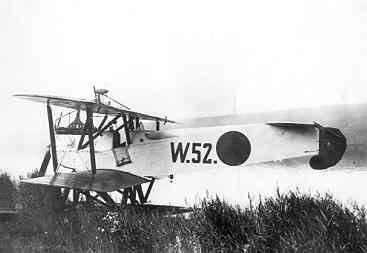
[Enclosed photo from BeeldBank NIMH. Click on photo for ordering information]
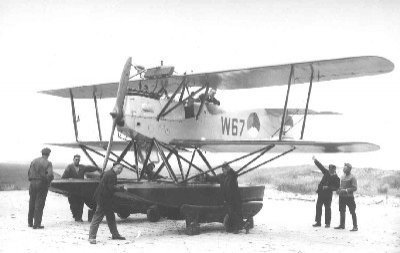
This is the Dutch version with a different, smaller radiator on the wing.
[Enclosed photo from BeeldBank NIMH. Click on photo for ordering information]
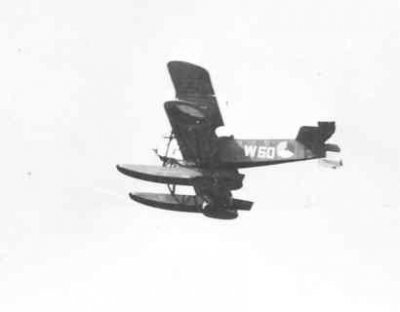
[Enclosed photo from BeeldBank NIMH. Click on photo for ordering information]
Note the dark grey scheme and the white serial.
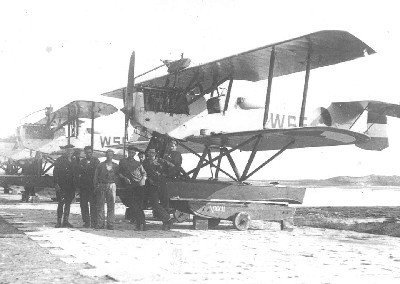
[Enclosed photo from BeeldBank NIMH. Click on photo for ordering information]
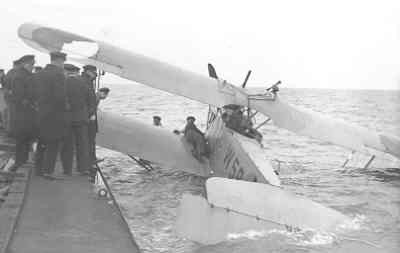
[Enclosed photo from BeeldBank NIMH. Click on photo for ordering information]
Note the national markings on top of the wing.

[Enclosed photo from BeeldBank NIMH. Click on photo for ordering information]
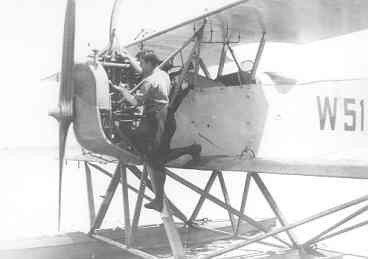
[Enclosed photo from BeeldBank NIMH. Click on photo for ordering information]
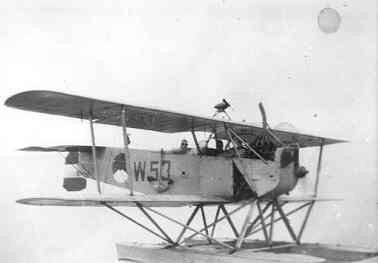
[Enclosed photo from BeeldBank NIMH. Click on photo for ordering information]
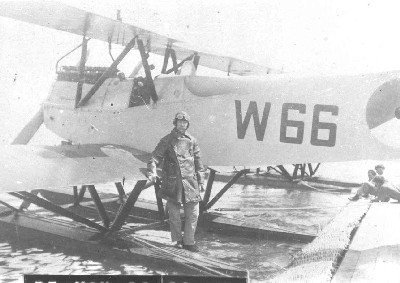
[Enclosed photo from BeeldBank NIMH. Click on photo for ordering information]
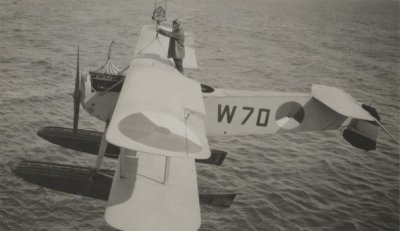
[Enclosed photo from BeeldBank NIMH. Click on photo for ordering information]
| Serial
Serial
|
Construction nr.
Construction nr.
|
Date in service
Date in service
|
Date out of service
Date out of service
|
Notes
Notes
|
|---|---|---|---|---|
| Used in Netherlands East Indies. | ||||
| W-1 | 2 | 10-1919 | 1924 | Entered service in oktober 1919. |
| W-2 | 4 | 10-1919 | 16-08-1928 | Entered service in oktober 1919. Written off. |
| W-3 | 5 | 11-1919 | 1924 | Entered service in November 1919. Written off 1924. |
| W-4 | 6 | 11-1919 | 1932 | Entered service in November 1919. Written off 1932. |
| W-5 | 7 | 11-1919 | 1929 | Entered service in November 1919. Written off 1929. |
| W-6 | 3 | 11-1919 | 1929 | Entered service in November 1919. Written off 1929. |
| W-7 | 1920 | 1929 | Entered service in 1920. Out of service in 1929. | |
| W-8 | 1920 | 1929 | Entered service in 1920. Out of service in 1929. | |
| W-9 | 1920 | 1932 | Entered service in 1920. Written off 1932. | |
| W-10 | 1920 | 1924 | Entered service in 1920. Written off 1924. | |
| W-11 | 1920 | 1922 | Entered service in 1920. Written off 1922. | |
| W-12 | 1920 | 1932 | Entered service in 1920. Written off 1932. | |
| W-12A | 1920 | 1929 | Entered service in 1920. Written off 1929. | |
| W-14 | 1920 | 1929 | Entered service in 1920. Out of service in 1929. | |
| W-15 | 1921 | 1924 | Entered service in 1921. Out of service in 1921. | |
| W-16 | 1921 | 02-06-1927 | Entered service in 1921. Crashed in Java Sea. | |
| W-17 | 1921 | 1932 | Entered service in 1921. Out of service in 1932. | |
| W-18 | 1921 | 1932 | Entered service in 1921. Out of service in 1932. | |
| W-19 | 1921 | 1922 | Entered service in 1921. Written off 1922. | |
| W-20 | 1921 | 1929 | Entered service in 1921. Out of service in 1929. | |
| W-21 | 1923 | 1929 | Built from the remains of W-11 and W-19. Entered service in 1932. Out of service 1929. | |
| Used in the Netherlands. | ||||
| W-51 | 8 | 12-1919 | 1933 | |
| W-52 | 9 | 11-12-1919 | 1933 | |
| W-53 | 10 | 16-12-1919 | 1933 | |
| W-54 | 11 | 18-12-1919 | 02-09-1930 | |
| W-55 | 12 | 29-12-1919 | 1933 | |
| W-56 | 13 | 1920 | 1933 | |
| W-57 | 1 | 1920 | 28-11-1924 | |
| W-58 | 1920 | 1933 | ||
| W-59 | 1920 | 1933 | ||
| W-60 | 1920 | 1933 | ||
| W-61 | 11920 | 1933 | ||
| W-62 | 1920 | 1933 | ||
| W-63 | 1920 | 1933 | ||
| W-64 | 1920 | 1933 | ||
| W-65 | 1920 | 1933 | ||
| W-66 | 1924 | 1933 | ||
| W-67 | 1924 | 1933 | ||
| W-68 | 1924 | |||
| W-69 | 1924 | 1933 | ||
| W-70 | 1924 | 1933 | ||
1/72nd Scale
Kits
- CzechMaster
- Kit 031/5003/5004: Resin kit for a Hansa Brandenburg W.12/II and W.12/V, which can be converted.
Modelling add-on
- --
- Kit --: --.
Decals
- --
- Kit --: ---.
1/48th Scale
Kits
- --
- Kit --: --
Modelling add-on
- --
- Kit --: --.
Decals
- --
- Kit --: ---.
| Scheme | Colour name | FS number | BS-number | Humbrol | XtraColor | Vallejo Model Color | Vallejo Model Air | |
|---|---|---|---|---|---|---|---|---|
| Delivery scheme | Underside | Light grey | 129 | X317 | 70.986 | |||
| Upperside fuselage, wings etc. | Dark Grey | 92 | 70.833? | |||||
| Struts, floats etc. | Black | ~7038 | 33 | 70.950 | ||||
| Standard scheme from 1925 and on | ||||||||
| Standard scheme #2 | Overall | Light Sea grey | 129 | X317 | 70.986 | |||
Check www.paint4models.com for an extensive conversion table with lots of colour and paint systems.
Literature.
| Zestig jaar Marineluchtvaartdienst in Beeld. | Hugo Hooftman | Pag. 14 - 18 | 1977 | Uitgever Europese Bibliotheek, Zaltbommel |
| Nederlandse Marinevliegtuigen | Thijs Postma & Nico Geldhof | Pag. 13 - 14 | 1978 | Uitgever Omniboek, 's Gravenhage |
| Vliegen voor de Vloot: 70 jaar Marineluchtvaartdienst | Har J,. Hazewinkel | Pag. 12 | Uitgever Rebo Produkties, Sassenheim | |
| AVIA; 40e jaargang nummer 1: Foto van Van Berkel WA W9 (donkere bovenzijde) | Pag. 85 | 1981 | Uitgever Uitgevers Wyt, Rotterdam | |
| De Nederlandse Vliegtuigen: Alle vliegtuigen ooit in Nederland ontworpen en gebouwd | Theo Wesselink & Thijs Thijs Postma | Pag. 19 - 20 | 1982 | Uitgever Romen Luchtvaart, Haarlem |
| Nederlandse vliegtuigen naar buitenlands ontwerp | Theo Wesselink & Thijs Postma | Pag. 23 - 26 | 1984 | Uitgever Romen Luchtvaart, Haarlem |
| 40 Jaar luchtvaart in Indië | Gerard Casius & Thijs Postma | Pag. 14 | 1986 | Uitgeverij De Alk, Alkmaar |
| Camouflage en Kentekens | J.Greuter e.a. | 1997 | Bonneville – Bergen (NH) | |
| Air Enthusiast no.80, The Historical Aviation Journal: Unexpected Windfalls | Bart van der Klaauw, | pag. 54 - 59 | 1999 | Uitgever Key Publishing,Stamford |
| 85 JAAR Marineluchtvaartdienst in beeld: Van Farman tot NH 90 Helikopter | Peter Korbee | Pag. 28 - 29 | 2002 | Uitgever Korbee MLD Promotie, Valkenburg |
Websites.
--
- Details
- Hits: 30377
History
In 1935, the US Navy released a new requirement for a carrier-based fighrter to replace the Grumman F-3F, a biplane.
The new aircraft manufacturer Brewster came with the XF-2A-1 a metal monoplane and Grumman came with the XF4-1, a biplane. The Seversky XFN-1, a naval version of the P-35 was dropped because the performance did not meet the requirements. Grumman also failed, but the XF4-1 was further developed by Grumman into the Grumman Wildcat.
The XF-2A was to some extent a further development of the first Brewster, the Brewster SBN, which was later developed into the SB2A-Buccaneer (or Bermuda as the RAF marked this aircraft.)
The somewhat older, but very reliable Wright Cyclone R-1820 was chosen as power source for the aircraft; Grumman had opted for the more modern Pratt & Whitney R-1830 Twin Wasp.
The Cyclone was fitted with a single-stage compressor, thus perfomrnace at 15000 feet was less than at ground level. The Twin Wasp was equipped with a two-stage compressor, and provided, at the same cylinder capacity better performance.
During the flight tests of the prototype, operformed in 1938, the Buffalo turned out to outperform the XF4-1. Also, the US Navy thought the Twin Wasp too complicated in comparison with the Wright Cyclone.
The XF2A-1 was modern for its time with an all-metal body and linen-covered control surfaces. Further, it had a hydraulically retractable landing gear, flaps and shared a streamlined canopy. The fuel capacity was relatively small, just 606 l, the Wright Cyclone R-1820-22 of 950 horsepower at start was equipped with a single-stage compressor, causing its power to decrease at higher altitudes. The climb rate of over 2500 ft/min was quite good and the maximum speed was reasonable with 447 km/hr at an altitude of 4879 m.
By improvement of the airintake an de the aerodynimcs os the engien cowling the top speed was increased to 489 km/hr.
The armament consisted of a fixed .50 inch machine gun plus one fixed .30 inch machine gun in the nose.
The first test flights of the prototype started in January 1938.
Brewster finally got the contract for 54 aircraft under the designation F2A-1 and the first delivery took place in May 1939. However, the delivery rate was very low, mainly due to the building, a former car factory. The factory was actually unsuitable for mass production of aircraft, not least because of the location, away from an airfield.
The first production aircraft was equipped with a Wright Cyclone R-1820-34 rated 940 hp at teke-off, a larger tail fin and the armament was expanded with two .50 inch machine guns in the wings. Also all kinds of additional equipment increased the overall weight, so the climb rate decreased to 2600 ft/min.
Due to problems in production just eleven examples were delivered, the rest being delivered to the Finnish Air Force under the designation Model 239.
The US Navy issued a follow-up order of 43 examples of an improved version, called F2A-2. This version had a more powerful Wright R-1820-40 engine rated 1200 hp, an improved propeller, but still lacked armor for the pilot and self-sealing fuel tanks.
The weight increased to 2700 kg, but despite the speed increased to a maximum of 520 km/hr at 5000 m, however the climb rate was further reduced to 2500 ft/min.
The US Navy bought 100 examples of another improved version, designated F2A-3Of the F2A-3, ordered in January 1941, though the US Navy had become more and more unsatisfied with the Brewster F2A and its manufacturer.
The F2A-3 had self-sealing tanks in the wings, an elongated body, whereby the weight is further increased and also armor for the pilot was added. This reduced performance still further and the maneuverability was more and more decreased.
One of the problems of the BRewster F2A had to do with the main landing gear. The support had a tendency to bend and thereby scrape against the edge of the wheel space, so that the landing gear could not be fully retracted. In practice, this was solved by removing some of the support. However, a hard landing could break them.
In this version, this problem became even more frequently, so the type was soon referred back to the second line or used as a trainer.
Versions.
- Brewster XF2A-1:
- the prototype
- Brewster F2A-1:
- first production version for the US Navy equipped with a Wright R-1820-34 Cycloneand two .50 inch machine gus in the wing. 11 examples built.
- Brewster F2A-2:
- 43 examples for the US Navy adn US Marines equipped with a Wright R-1820-40 Cyclone and four machine guns in the wings.
- Brewster F2A-3:
- 108 examples of an improved F2A-2 for the US Navy with a enlarged range and provisions for a bomb load under the wings.
- Brewster XF2A-4:
- test version of the F2A-3.
- Brewster B-239:
- Export version of the F2A-1 for Finland with a Wright R-1820-G5 and four machine guns.
- Brewster B-339B:
- Export-version for Belgium, 40 examples built.; two delivered, the rest was delivered to the British FAA.
- Brewster B-339C:
- 24 examples of an export version for Netherlands East Indies with a Wright GR-1820-G-105 Cyclone.
- Brewster B-339D:
- 48 examples of an export version for Netherlands East Indies with a 1200 hp (894.8 kW) Wright R-1820-G-205A Cyclone.
- Brewster B-339E:
- 170 examples of an export version of the F2A-2 as Buffalo Mk. I for the Royal Air Force with a Wright GR-1820-G-105 Cyclone.
- Brewster B-339-23:
- Also referred to as B-439; export version of the F2A-3 for the Netherlands East Idies with 1000 hp Wright GR-1820-G205A engine; 20 examples built, but all were delivered to RAAF and some to USAAF
| Dimensions: | |||
| Length: | 7,92 m | Wingspan: | 10,67 m |
| Height: | 3,66 m | Wing area: | 19,42 m2 |
| Weights: | |||
| Empty weight: | 2076 kg | Max. start weight: | 3125 kg |
| Performances: | |||
| Max. speed: | 494 km/hr | Rate of climb: | 4700 ft/min (ca 1500 m/min) |
| Range: | 1553 km | Service ceiling: | abt 10000 m |
| Miscellaneous: | |||
| Engine type: |
One Wright Cyclone GR-1820-G105A rated 1100 hp (B-339C) One Wright Cyclone G-205A rated 1200 hp (B-339D) |
||
| Crew: | One | ||
| Armament: | Two 12.7 mm machine guns plus two 7.7 mm machine guns | ||
| Dimensions: | |||
| Length: | 8,03 m | Wingspan: | 10,7 m |
| Height: | 3,68 m | Wing area: | 19,42 m2 |
| Weights: | |||
| Empty weight: | 2146 kg | Max. start weight: | 3247 kg |
| Performances: | |||
| Max. speed: | 424 km/hr | Rate of climb: | 3100 ft/min (ca 945 m/min) |
| Range: | 1553 km | Service ceiling: | abt 10000 m |
| Miscellaneous: | |||
| Engine type: |
One Wright Cyclone GR-1820-G5B rated 1000 hp |
||
| Crew: | One | ||
| Armament: | Four 12.7 mm machine guns | ||
The Dutch East Indies Brewster B-339C, a land version of the Brewster F2A-2 Buffalo, was fitted with a Wright Cyclone G-105A engine rated 1100 hp. Of this engine still 31 examples were available from stocks, originally destined for the Dutch Dornier Do-24K . Twentyfour aircraft, designated B-339C were equipped with these engines.
Furthermore 54 (second hand) Wright Cyclone G-205A engines rated 1200 hp were obtained. These ex TWA engines were overhauled by the Wright factory. These engines were used for the remainder of the Brewster B-339s, which were designated as B-339D.
In February 1941 an additional series of twenty examples, referred to as B 339-23, was ordered. These were largely equivalent tothe F2A-3 version of the US Navy and were slightly longer and slightly heavier. For this order twentytwo Ex KLM Wright Cyclone R-1820-G2 engines were purchased. These were overhauled by the factory and put tp standard G5B and produced 1000 hp each.
Because the performance was considerably less, these series was initially intended for the training of fighter pilots.
Because of difficulties in the supply of components, these series was not delivered to the NEtherlands East Indies and taken over by the RAAF and USAAF.
These machines would receive registrations between B3-167 and B3-186.

[Enclosed photo from BeeldBank NIMH. Click on photo for ordering information]

[Enclosed photo from BeeldBank NIMH. Click on photo for ordering information]

[Enclosed photo from BeeldBank NIMH. Click on photo for ordering information]

[Ingesloten foto van BeeldBank NIMH. Klik op de foto voor bestel-informatie]

[Enclosed photo from BeeldBank NIMH. Click on photo for ordering information]
| Serial
Serial
| Construction nr.
Construction nr.
| Date in service
Date in service
| Date out of service
Date out of service
| Notes
Notes
|
|---|---|---|---|---|
| B-395 | 259 | 06-1941 | 09-03-1942 | Captured by Japanese after the capitulation |
| B-396 | 260 | 06-1941 | 17-01-1942 | Crashed on a mountain due to bad weather |
| B-397 | 261 | 06-1941 | ||
| B-398 | 262 | 06-1941 | 09-02-1942 | Emergency landing after dog fight |
| B-399 | 263 | 06-1941 | 07-01-1942 | Heavily damaged in landing at Kalang and written off. |
| B-3100 | 264 | 06-1941 | 12-01-1942 | Shot down near Singapore |
| B-3101 | 265 | 06-1941 | 07-03-1942 | Last mission flown om March 7, 1942. Captured? |
| B-3102 | 266 | 06-1941 | ||
| B-3103 | 267 | 06-1941 | 15-01-1942 | Shot down near Singapore |
| B-3104 | 268 | 06-1941 | 21-02-1942 | |
| B-3105 | 269 | 06-1941 | 15-01-1942 | Landed into sea due to engine failure. |
| B-3106 |
270 |
06-1941 | ||
| B-3107 | 271 | 06-1941 | 23-02-1942 | Written of Andir |
| B-3108 | 272 | 06-1941 | 06-01-1942 | Crashed whiling taking off from Palembang I |
| B-3109 | 273 | 06-1941 | ||
| B-3110 | 274 | 06-1941 | 07-03-1942 | Emergency landing af dogfight witrh Mitsubishi A6M |
| B-3111 | 275 | 06-1941 | ||
| B-3112 | 276 | 06-1941 | ||
| B-3113 | 311 | 07-1942 | ||
| B-3114 | 312 | 07-1942 | 09-03-1942 | Captured by Japanese after the capitulation; The aircraft was already cannibalized. |
| B-3115 | 313 | 07-1942 | 23-01-1942 | Reported missing after attack of Japanese fleet |
| B-3116 | 314 | 07-1942 | ||
| B-3117 | 315 | 07-1942 | 07-03-1942 | Shot down above Andir, killing Kapt. van Helsdingen. |
| B-3118 | 316 | 07-1942 | ||
| Brewster B-339D | ||||
| B-3119 | 317 | Damaged during test flight at factory. Ater the capitulation of Nei deliverd to RAAF as 3119. (source: ADF-serials.com ) | ||
| B-3120 | 318 | 09-03-1942 | Captured by japan | |
| B-3121 | 319 | |||
| B-3122 | 320 | 21-02-1942 | Written off at Tjiater Pass | |
| B-3123 | 321 | |||
| B-3124 | 322 | |||
| B-3125 | 323 | |||
| B-3126 | 324 | 28-01-1942 | Lost after attack on airfield Samarinda II | |
| B-3127 | 325 | |||
| B-3128 | 326 | |||
| B-3129 | 327 | |||
| B-3130 | 328 | |||
| B-3131 | 329 | |||
| B-3132 | 330 | 24-01-1942 | Shot down above Semplak | |
| B-3133 | 331 | 19-02-1942 | Written off Paroeng | |
| B-3134 | 332 | |||
| B-3135 | 333 | |||
| B-3136 | 334 | |||
| B-3137 | 335 | |||
| B-3138 | 336 | |||
| B-3139 | 337 | |||
| B-3140 | 338 | |||
| B-3141 | 339 | |||
| B-3142 | 340 | 02-03-1942 | Written off Andir | |
| B-3143 | 341 | 19-02-1942 | Written off Andir | |
| B-3144 | 342 | |||
| B-3145 | 343 | |||
| B-3146 | 344 | |||
| B-3147 | 345 | 19-02-1942 | Written off Andir | |
| B-3148 | 346 | |||
| B-3149 | 347 | |||
| B-3150 | 348 | |||
| B-3151 | 349 | 23-10-1941 | Crashed | |
| B-3152 | 350 | |||
| B-3153 | 351 | 09-03-1942 | Destroyed by Technical crew | |
| B-3154 | 352 | |||
| B-3155 | 353 | |||
| B-3156 | 354 | 09-03-1942 | Destroyed by Technical crew | |
| B-3157 | 355 | |||
| B-3158 | 357 | |||
| B-3159 | 358 | 24-01-1942 | B-3159 was shot down on 24 jan. 1942.
Pilot: Theodorus Joseph de Waardt; born December 1, 1916; died in action January 24, 1942. |
|
| B-3160 | 359 | 09-03-1942 | Destroyed by Technical crew | |
| B-3161 | 360 | 09-03-1942 | Destroyed by Technical crew | |
| B-3162 | 361 | Not delivered; Possibly to RAAF | ||
| B-3163 | 362 | Not delivered; Possibly to RAAF | ||
| B-3164 | 363 | Not delivered; Possibly to RAAF | ||
| B-3165 | 364 | Not delivered; Possibly to RAAF | ||
| B-3166 | 365 | Not delivered; Possibly to RAAF | ||
1/72nd Scale
Kits
- Airfix
- Kit 02050: An older model, but it is quite accurate. It is equipped with the underside window under the cockpit area.
-
Building report of this kit on Youtube
-
- Kit 02050: An older model, but it is quite accurate. It is equipped with the underside window under the cockpit area.
- Revell and Aoshima
- These models are of rather pore quality and hardly available at the moment.
- Matchbox
- Kit PK-24:This model had decals for a example of the pre war NEIAF. This was a rather good model, but it didn't have the lower window.
- Hasegawa
- Kit 24AP45: Buffalo F2A-2. A rather new model is the Buffalo of Hasegawa. I haven't had the opportunity to buy this one yet, but it is one of the best Buffalo models in 1/72nd scale.
- Kit 24AP148: Brewster F2A-1 Buffalo.
- Kit 2400915: Brewster B239 Buffalo "Finnish AF".
- Kit 2400968 / 2401974: Brewster F2A-1/2 Buffalo "US Navy Combo" (2 kits included).
- HobbyBoss
- Kit 80290: F2A-1 Buffalo (US Navy).
- Special Hobby: It is said that these are the best Buffalo models thus far.
- Kit SH72126:Brewster F2A-3 Buffalo "Defender of Midway".
- Kit SH72133: Brewster F2A-2 Buffalo "Yellow Wings".
- Kit SH72218: Brewster Mod. 339D Buffalo Mk.I "Dutch and Japanese Service".
- Kit SH72131: Brewster Model 339B/E Buffalo MK1 (also usable for KNIL version).
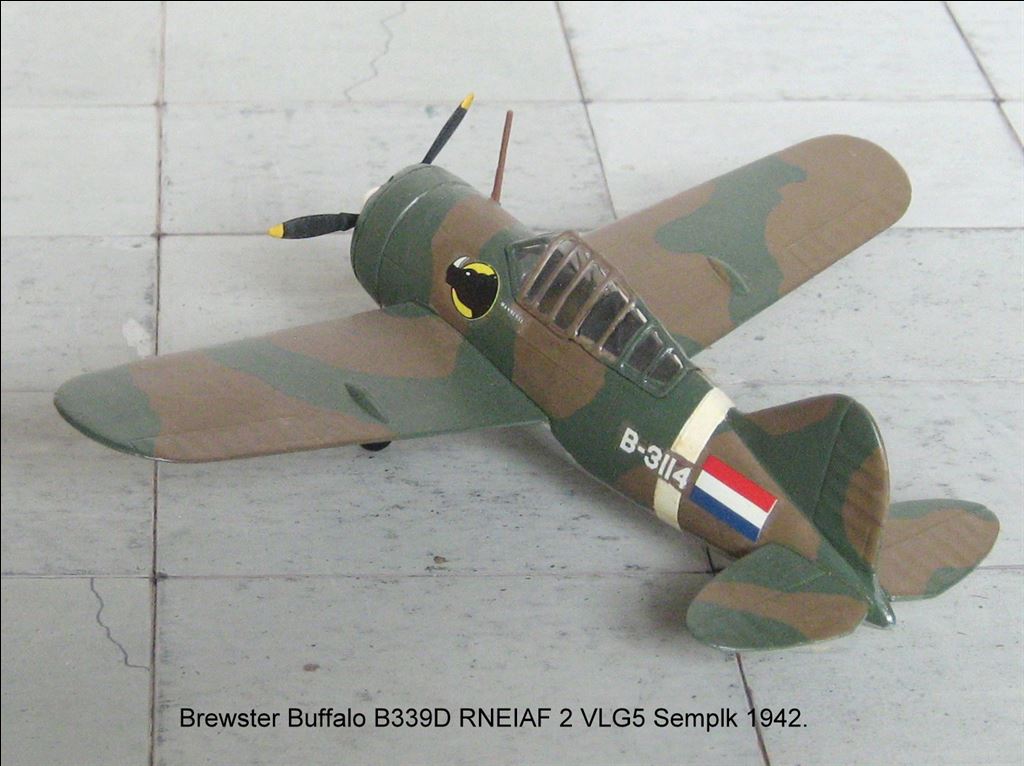
Modelling add-on
- Pavla
- Set C72048: Brewster Buffalo MK1 interior set and decals
- Set C7243: F2A-2 Buffalo Interior set & Canopy
- Set U72-59: Brewster F2A Buffalo wing set, Control Surfaces and Armament:
- Eduard
- Set E72-221: Detailset Brewster F2A Buffalo
- Set E72-233: Detailset Brewster Buffalo Mod339 (Hasegawa)
- Marti Kuivalainen
- Set KPE72020: Detailset Finnish Brewster 239 interior (Hasegawa) (DOUBLE sheet
- Falcon
- Set VAX11: Canopies US Navy WW2 (PBY5 Catalina, F4U-1, Ventura, SB2C, F2A) .
- QuickBoost
- Set 72032: Brewster B339 Buffalo engine (Hasegawa)
- Squadron Signal
- Set 09132: Canopies Brewster Buffalo.
Decals
- Tally Ho
- Set 7137: Set for several NEIAF aircraft such aas Brewster F2A; B-25 Mitchell and Curtiss P40N
- Dutch Decal
- Set 72011: Set for several types of aircrat such as Brewster Buffalo B-3114 wiht Rhinoceros marking.
- Set 72030: Set for several types of aircrat such as Brewster Buffalo B-3132
- Dutch Profile
- Set DDS87248: Brewster B339 Buffalo (RNEIAF) (both 1/72nd and 1/48th scale).
- FlevoDecal
- Set FD72-012: Set for five Brewsters, Curtiss Hawk 75, Curtiss CW-21 en CW-22; Messerschidt Me-18, Ryan STM, Lockheed 12 en Lodestar, Bücker Bu-131 and Martin WH-1 and WH-2
1/48th Scale
Kits
- Classic Airframe
- Kit 4100: Brewster F2A-1 Buffalo
- Kit 4101: Brewster Type 239 Buffalo (Finnish Type)
- Special Hobby
- Kit SH48057: B339-23 Buffalo "In RAAF and USAAF Colours"
- Kit SH48098: Brewster F2A-3 Buffalo "US Navy Trainer"
- Tamiya
- Kit 61094: Brewster B339 Buffalo "Pacific Theatre" (RAF, US Navy Netherlands East Indies AF)
- Kit 61019-1000: Brewster F2A-2 Buffalo
Modelling add-on
- Aires
- Set 4166: Wright R1820 Cyclone (B17, F2A. P36).
- Airwaves
- Set C4850: Detailset Brewster F2A-2 Buffalo.
- Brengun Model Accesoires
- Set RL48026: F2A Buffalo Flaps and controls (Special Hobby, Classic Airframe.
- CMK
- Set 4167: Buffalo F2A-1/2/3 Armament Set (Special Hobby/Classic Airframe).
- Set 4168: F2A-1/2 Buffalo Control surfaces set (Special Hobby/Classic Airframe).
- Set 4169: F2A-1/2/3 Buffalo Undercarriage set (Special Hobby/Classic Airframe).
- Set 4170: Buffalo F2A-1/2/3 Interior Set (Special Hobby/Classic Airframe).
- Set 4171: F2A-1/2/3 Buffalo R1830 Engine set complete with cowling (Special Hobby/Classic Airframe).
- Eduard
- Set E49-292 / FE292: Detailset Brewster Buffalo Model 339 (Tamiya)
- Set E49-279 / FE279: Detailset Brewster Buffalo (Tamiya)
- Set E48-033: Detailset Brewster F2A Buffalo
- Falcon
- Set VAX12: Canopies US Navy WW2 (F2A Buffalo, F8F Bearcat, F4U, Duck, T6).
- Pavla
- Set V4806: F2A-2 Buffalo Canopy.
- Set 48007: F2A-2 Buffalo upgrade set (Tamiya).
- Scale Aircraft Conversions
- Set 48192: Brewster F2A Buffalo Landing Gear (Tamiya).
- Set 48203:F2A Landing Gear (Tamiya).
- Squadron Signal
- Set 09132: Canopies Brewster Buffalo.
- True Details
- Set 48512: Brewster Buffalo MK1/B339 cockpit detail set (Tamiya)
- Set 48073: Brewster F2A Buffalo Wheel Set
- Red Roo
- Set M48114: Brewster F2A-3/Model339 Buffalo (ook KNIL)
- Set M48117: Brewster F2A-2 Buffalo MK1 Conversion (ook KNIL)
- Vector Resin
- Set 48005: Wright R1820G/Shvetsov M62, M63 .
Decals
- AMD
- Set 48-619: Buffalo`s over South East Asia (RAAF, RAF, KNIL)
- Dutch Profile
- Set DDS87248: Brewster B339 Buffalo (RNEIAF) (both 1/72nd and 1/48th scale).
- FlevoDecal
- Set FD48-012: Set for vijf Brewsters, Curtiss Hawk 75, Curtiss CW-21 en CW-22; Messerschidt Me-108, Ryan STM, Lockheed 12 en Lodestar, Bücker Bu-131 and Martin WHh-1 and WH-2
- Tally Ho
- Set 4104: Brewster F2A Buffalo (KNIL)
All aircraft were sprayed in the so called "jong blad" (dark green) and "oud blad" (olive drab) camouflage pattern on upper surfaces and aluminium sprayed undersides.
During the armistice several Buffaloes were received from RAF, these aircraft had the standard RAF camouflage applied.
| Scheme | Colour name | FS number | Humbrol | XtraColor | Vallejo ModelColor | Vallejo ModelAir | |
|---|---|---|---|---|---|---|---|
| Standard #1 | Upper surfaces | Dark Green | ~4092 | 149 | X114 | 70.895 ? | 71.014 |
| Olive drab | 66 | X112/X113 | 70.889 | 71.034 | |||
| Undersides | Aluminium | ~7178 | 191 / 56 | X126 | 70.864 | 71.062 | |
For an extended conversion table with very many colour and paint systems check (doen not work with Firefox) www.paint4models.com
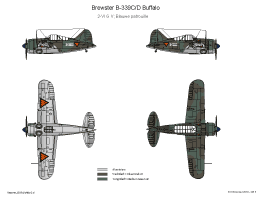
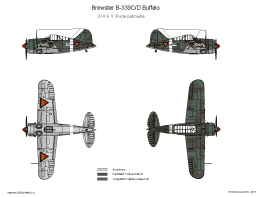
Literature.
| Militaire Luchtvaart in Nederlandsch-Indië in beeld, Deel 2 | Hugo Hooftman | Pag. 4 - 16 | 1981 | Europese Bibliotheek, Zaltbommel |
| Modelbouw In Plastic jaargang 9, nummer 2: De Brewster Buffalo. | Hans Berfelo & Erik-Jan Brans | Pag. 33 - 41 | 1980 | Uitgever I.P.M.S. Nederland |
| AVIA; 41e jaargang nummer 5: Luchtvloot van Plastic: De Buffalo.... een oude liefde | Hans Loeber | pag. 194 - 197 | 1982 | Uitgevers Wyt Plaats: Rotterdam |
| 40 Jaar luchtvaart in Indië | Gerard Casius & Thijs Postma | Pag. 62,67 | 1986 | Uitgeverij De Alk Plaats: Alkmaar |
| De Luchtstrijd rond Borneo | P.C.Boer | 1987 | Uitg. Van Holkema & Warendorf | |
| Aircraft Number 81: F2A Buffalo in action | Jim Maas | pag. 16 - 36 | 1987 | Squadron/Signal Publications Inc., Carrolton, Texas |
| De Luchtstrijd om Indië | P.C.Boer e.a. | 1990 | Uitg. Van Holkema & Warendorf | |
| Camouflage en Kentekens | J.Greuter e.a. | 1997 | Bonneville – Bergen (NH) |
Websites.
Specials thanks to Stephen de Waardt for his additional information regarding Brewster B-3159.
- Details
- Hits: 13909
History
This aircraft was initially designed by Breguet as maritime patrol aircraft in order to reflect the NATO specifications from 1958 for a successor of the Lockheed Neptune.
The Atlantic was built and developed by a European consortium of aircraft factories, operating as SECBAT (Société d'Étude et de Construction de Breguet Atlantic).
The first prototype made its maiden flight in October 1961, the second one made its first flight in February 1962.
in 1963 an initial French order for 40 examples plus an order for 20 examples for Germany, was received. The first pre production aircraft made its maiden flight in February 1963; the second one in September 1964. Both had an extended fuselage.
Delivery of the German and French order took place between 1965 and 1968.
The production was just ended, when The Netherlands ordered nine aircraft, soon followed by an Italian order for eighteen aircraft.
Characteristic is the fuselage, which consists in fact of two tubes. The upper part houses a pressurized crew compartment and the control equipment and the lower part an area of 9 meters for the submarine war fare, such as eight guided torpedoes, depth charges or mines. Furthermore, a MAD is present in the tail boom, radar scanner in a retractable radome under the fuselage.
A secondary tasks of the Atlantic is long range maritime patrol and also SAR tasks.
In 1978, the French government ordered the development of a updated version, the Atlantic Nouvelle Generation.
Especially the equipment and avionics were modernized; a new radar, sonar, tactical computer, FLIR-installation was added. Also it was possible to carry the Exocet rocket. Two existing Atlantics were used to built the prototypes. The first one made its maiden flight in May1981.
In the end 28 examples of the Atlantic 2 were built.
| Dimensions: | |||
| Length: | 32,63 m | Wingspan: | 37,42 m |
| Height: | 10,89 m | Wing area: | 123,34 m2 |
| Weights: | |||
| Empty weight: | 25 700 kg | Max. start weight: | 46 200 kg |
| Performances: | |||
| Max. speed: | 648 km/hr | Rate of climb: | |
| Range: | Service ceiling: | 9144 m | |
| Miscellaneous: | |||
| Engine type: | Two Rolls Royce Tyne R.Ty-20 rated 6105 pk | ||
| Crew: | Twelve men. | ||
| Armament: | Torpedoes, mines, sonobuoys, depth bombs | ||
Because the aircraft carrier "Karel Doorman" was withdrawn from use in October 1968, which was earlier than planned, the Dutch navy was no longer capable to monitor the Dutch part of the Atlantic ocean, because the range of the Grumman S-2F Tracker was to small.
It was decided to order nine Breguet Br.1150 Atlantic LRMPA (Long Range Maritime Patrol Aircraft). This aircraft had a range of about 18 hours.
Initially many problems occurred. The Dutch Navy was more familiar with US material and procedures. Especially the technicians had problems with the French documentation, procedures, etc..
The first Atlantic entered service in August 1969.
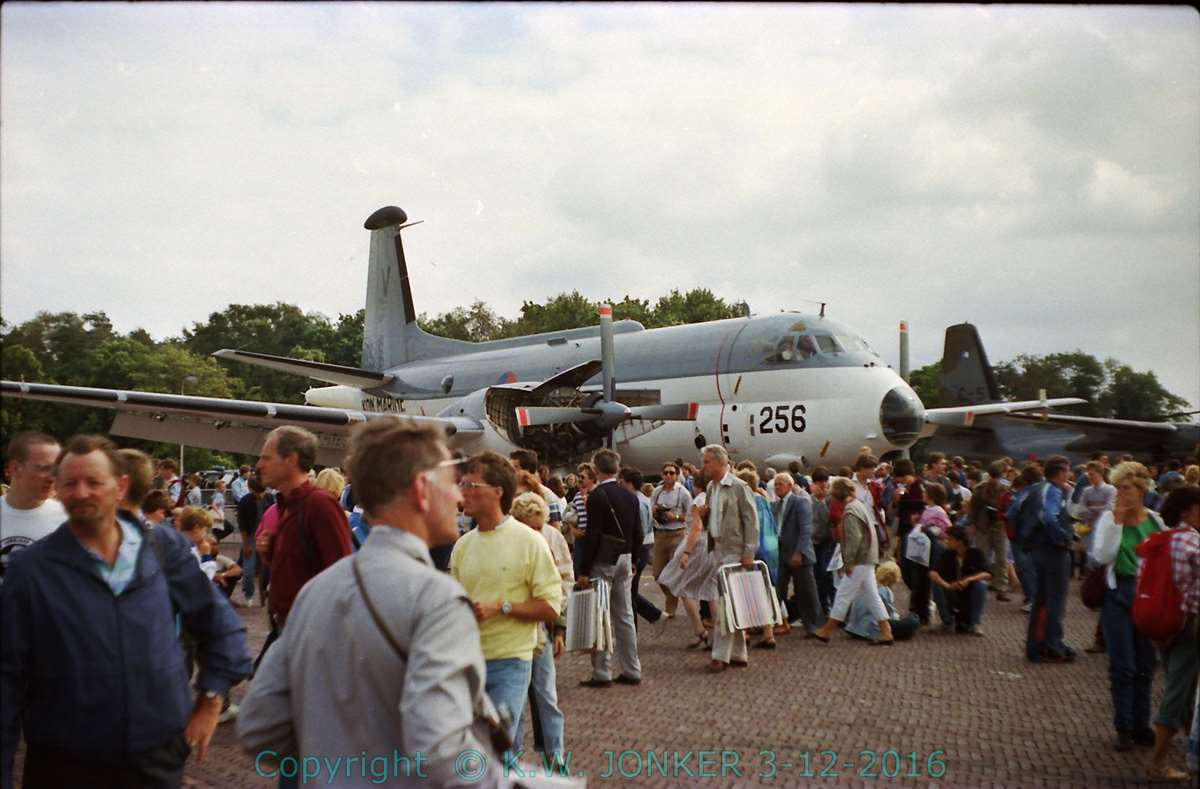
Breguet Atlantic 256 at the Open Day Dutch Air Force, September 1984 at airbase Soesterberg.
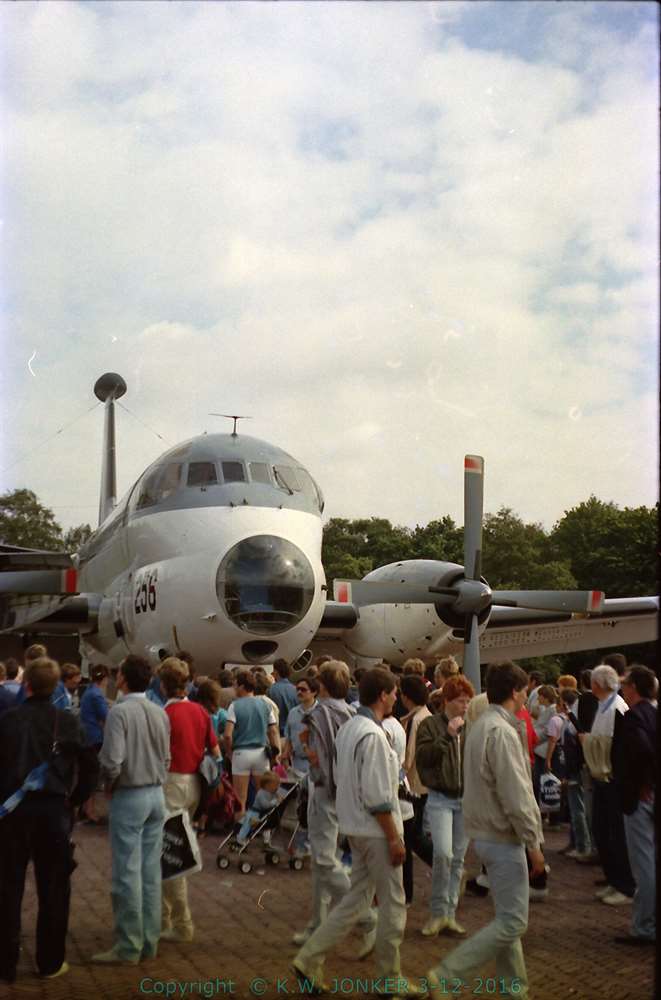
Breguet Atlantic 256 at the Open Day Dutch Air Force, September 1984 at airbase Soesterberg..
Alas the Atlantic suffered many technical problems and three aircraft crashed, so it was decided to withdraw the Atlantic from use in December 1984. The remaining six aircraft were sold to France.
The Atlantic was succeeded by the Lockheed P-3C Update II Orion, which also replaced the outdated Lockheed SP-2H Neptune.
Video's Breguet BR.1150 Atlantic
| Serial | Construction nr. | Date in service | Date out of service | Notes |
|---|---|---|---|---|
| 250 | 55 | 24-02-1970 | 28-12-1984 | Struck of charge and sold on 28-11-1985 to France. Delivery to Escadrille de Reception et de Convoyage (de la Marine Française) on 07-05-1986 |
| 251 | 56 | 16-07-1969 | 28-12-1984 | Struck of charge and sold on 28-11-1985 to France. Delivery to Escadrille de Reception et de Convoyage (de la Marine Française) on 07-03-1986 |
| 252 | 57 | 15-10-1969 | 28-12-1984 | Struck of charge and sold on 28-11-1985 to France. Delivery to Escadrille de Reception et de Convoyage (de la Marine Française) on 11-04-1986 |
| 253 | 58 | 29-07-1969 | 14-09-1978 | Crashed in North Sea near Scotland. |
| 254 | 61 | 17-06-1971 | 28-12-1984 | Struck of charge and sold on 28-11-1985 to France. Delivery to Escadrille de Reception et de Convoyage (de la Marine Française) on 04-02-1986 |
| 255 | 62 | 06-10-1971 | 15-01-1981 | Crashed in Irish Sea |
| 256 | 63 | 03-12-1971 | 28-12-1984 | Struck of charge and sold on 28-11-1985 to France. Delivery to Escadrille de Reception et de Convoyage (de la Marine Française) on 18-12-1985 |
| 257 | 64 | 12-20-1971 | 15-08-1975 | Emergency landing in sea near Wassenaar. Struck of charge. |
| 258 | 65 | 08-02-1972 | 28-12-1984 | To France 28 December 1984. |
1/72nd Scale
Kits
- Mach2
- Kit XX: Short Run injection moulded kit.
- Revell
- Kit 04329: Injection moulded kit with decals for RNlAS, German navy and Aeronavale
- Kit 04329: Injection moulded kit with decals for RNlAS, German navy and Aeronavale
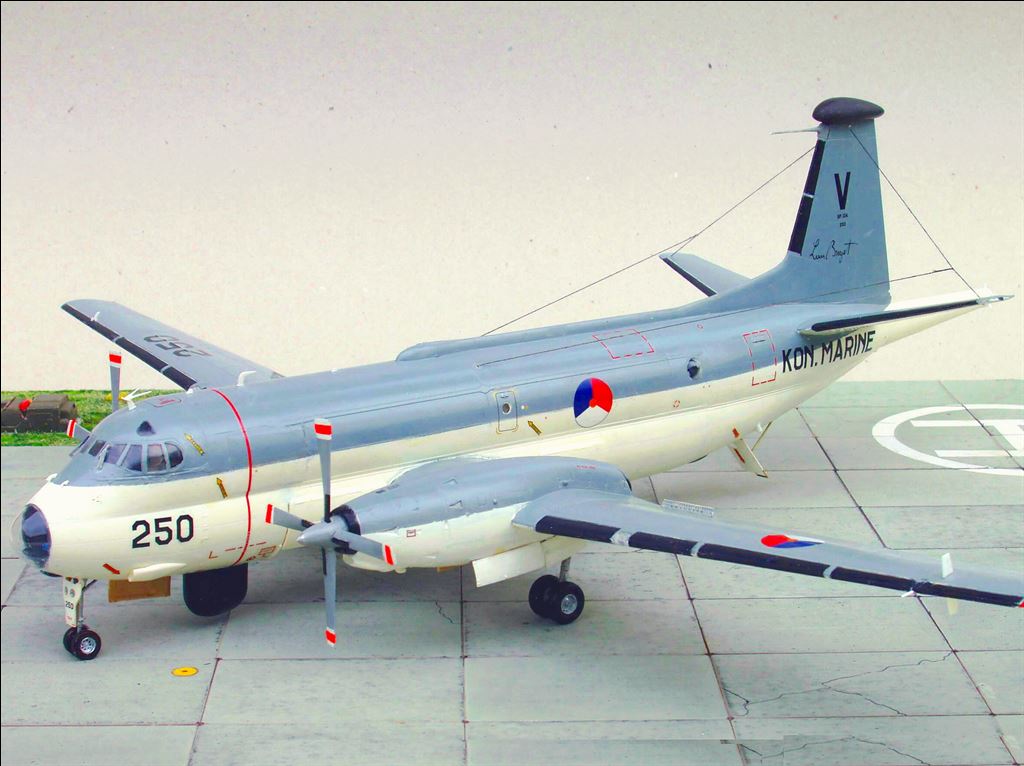
Modelling add-on
- Eduard
- Set E72-427: Detailing set Breguet Br1150 Atlantic (Revell)
Decals
- Dutch Decal
- Set 72082: Lockheed P3C Orion, Breguet SP13A Atlantic (serials)
1/48th Scale
Kits
- -
- Kit --: --
Modelling add-on
- --
- Set --: --
Decals
- -
- Set --: --
The first aircraft delivered had a somewhat different grey colour, a French grey colour, Gris Blue Clair, which could be compared with Humbrol Authentic Color HF-4 and XtraColor X396.
These aircraft also had yellow propeller tips. Later they received the same grey colour as the rest of the aircraft and also white-dayglo-white propellertips.
| Scheme | Colour name | FS number | Humbrol | XtraColor | Vallejo Model Color | Vallejo Model Air | Hataka | |
|---|---|---|---|---|---|---|---|---|
| Standard #1 | Upper surfaces | Grey | ~6270 | Mix: 1*156 + 1*34 (127) | X133 | 70.870 | 71.275 | ~054 |
| Undersides | white | ~7875 | 22 | X141 | 70.842 | 71.279 | ~049 | |
Check www.paint4models.com for an extensive conversion table with lots of colour and paint systems.
Literature.
| Zestig jaar Marineluchtvaartdienst in Beeld. | Hugo Hooftman | pag. 150 - 153 | 1977 | Uitgever Europese Bibliotheek, Zaltbommel |
| Nederlandse Marinevliegtuigen | Thijs Postma & Nico Geldhof | pag. 74 - 75 | 1978 | Uitgever Omniboek, 's Gravenhage |
| AVIA; 42e jaargang nummer 11: Gaat de Atlantic uit de lucht? | Bart Wendstedt | Pag.388 - 390 | 1983 | Uitgevers Wyt, Rotterdam |
| De geschiedenis van squadron 321: Nooit op de tweede plaats | Bart M. Rijnhout | pag. 45 - 67 | 1984 | Uitgever De Bataafsche Leeuw, Amsterdam |
| Modelbouw in Plastic jaargang 14, nummer 1: 15 Jaar Atlantic in de MLD | Frans van 't Hof | Pag. 2 - 7 | 1985 | Uitgever I.P.M.S. Nederland, Nederland |
| Luchtvaartwereld; 2e jaargang nummer 5: Adieu Atlantic ...Welkom P-3 CHARLIE | Nico Geldhof | Pag. 139 - 140 | 1985 | Uitgeverij Ten Brink, Meppel |
| 70 Jaar Marine-LuchtvaartDienst | Nico Geldhof | pag. 137 - 147 | 1987 | Uitgeverij Eisma b.v., Leeuwarden |
| Vliegen voor de Vloot: 70 jaar Marineluchtvaartdienst | Harm J. Hazewinkel | Pag. 55 - 56 | 1987 | Rebo Produkties, Sassenheim |
| Vliegtuigsquadrons 320 en 321 50 jaar | P. Staal & Peter Baeten | Pag. 89 - 93 | 1990 | Uitgever Afdeling Maritieme Historie, 's Gravenhage |
| Modelbouw in Plastic jaargang 21, nummer 3: Brequet Sp-13A Atlantic deel 1 | Bas Damen & Meindert de Vreeze | Pag. 66 - 77 | 1992 | Uitgever I.P.M.S. Nederland, Nederland |
| Camouflage en Kentekens | J.Greuter e.a. | 1997 | Bonneville – Bergen (NH) | |
| 85 JAAR Marineluchtvaartdienst in beeld: Van Farman tot NH 90 Helikopter | Peter Korbee | Pag. 146 - 147 | 2002 | Uitgever Korbee MLD Promotie, Valkenburg |
Websites.
- Details
- Hits: 20294
History
At the end of 1956 the US Army released a set of specifications for a turbine-powered transport helicopter to replace the Sikorsky CH-37 Mojave. Vertol started designing a new tandem-rotor transport helicopter designated as Model 107.
In June 1958 Vertol received a contract for one YHC-1A, which could carry 20 men. During the testing period the US Army thought the YHC-1A to light for the transport role an to heavy for the attack role. It was decided to upgrade the UH-1 Huey and use is for tactical transport and to obtain an heavy transport helicopter.
The YHC-1A was developed further and used by the US Marines as CH-46 Sea Knight in 1962.
The US Army ordered a larger and heavier version, Model 114, designated as HC-1B. The first pre-production machine Boeing-Vertol YCH-1B (Vertol was merged with Boeing to Boeing-Vertol) made its first flight on September 21, 1961. In 1962 the designation was changed in CH-47A "Chinook".
The new helicopter was powered by twin-shaft turbine engines, initial two Lycoming T-53 of 2200 hp, each mounted at the rear of the fuselage. Later models were equipped with upgraded, more powerful engines. Moreover, the two rotors rotate against each other in order to compensate for the torque and could be controlled separately. In case of failure of one of the engines the remaining engine can drive both rotors.
The Chinook was further developed in the course of time and improved and more powerful versions were released. The CH-47D was a major improvement with better engines, composite rotor blades, redesigned cockpit, improved electrical systems and avionics.
Also a civilian version, designated Boeing-Vertol Model 234 was developed and mainly used in the oil industry.
Versions.
- HC-1B:
- pre 1962 designation of the Boeing-Vertol Model 114
- CH-47A:
- 349 examples of the first produced version for the US Army; initially equipped with two Lycoming T55-L-5 engines rated 1640 kW, later two Lycoming T55-L-7C rated 2130 kW.
- ACH-47A: armed version. Four examples of the CH-47A modified in 1965.
- CH-47B:
- 108 examples of an interim version equipped with two Lycoming T55-L-7C engines of 2130 KW each. Modifications were the Adjustments were the blunted rear rotor pylon, redesigned asymmetrical rotor blades and guides along the tailgate and trunk to improve the flying characteristics.
- CH-47C:
- Boeing Model 234. 233 examples built. Equipped with more powerful engines and gear boxes. The first examples still had the Lycoming T55-L-7C engines rated 2130 KW each, later two Lycoming T55-L-11 engines rated 2800 kW each were installed. Canada ordered eight examples designated as CH-147. These were equipped with a hoist and a station for the Flight Engineer in the rear cabin.
- HC1: RAF version of the CH-47C
- CH-47D:
- Used the same airframe in combination with powerful engines.Initially the Lycoming T55-L-712 was used, soon replaced with the Lycoming T55-Ga-714A. The CH-47D could carry an external load of 12 tons with the triple cargo hook system. Also the avionics were improved with e.g. GPS.The first CH-47D entered service in 1979. The Us Army had nearly all its Chinooks, 472 examples. upgraded tot CH47D standard.
- HC2 and HC2A: RAF version.
- The Netherlands acquired the seven remaining CH-147’s from Canada and these were completely overhauled and upgraded to CH-47D. Other improvements were the Bendix weather radar in the extended nose, ‘glass cockpit’ and improved Honeywell T55-L-714A engines. Also six new examples were obtained.
- MH-47D: version developed for special duties and had a inflight refuelling system, and a fast-rope system. Twelve examples were built and six were modified older versions.
- MH-47E:
- 26 examples of a version for the US Army Special Operations. Similar to the MH-47D but with enlarged fuel capacity and terrain radar.
- HC-3: RAF version. Due to problems with the avionics all were modified to HC-2 standard.
- CH-47F:
- Released in 2001; the prototype was an upgraded CH-47D. Can carry 9,5 ton external load. the CH-47F has a upgraded airframe construction; two Honeywell T55-L-714A engines rated 3630 kW each and renewed electronics like a Rockwell Collins Common Avionics Architecture System (CAAS) and a BAE Systems Digital Advanced Flight Control System (DAFCS). The US Army ordered 48 examples ; The Netherlands ordered six examples replace lost CH-47Ds and to expand the existing Chinook fleet.
- CH-47F Block 2: version planned for 2020 capable to carry 10 ton; higher take off weight and new Advanced Chinook Rotor Blades (ACRB) ; more powerful Honeywell T55-715 engines and the Active Parallel Actuator System (APAS), an advanced control system. Also the fuel system is revised and enlarged and the electric system expanded.
- CH-47F Block 3: this version is planned for 2025 with more powerful engines, transmission and extended fuselage.
- MH-47G:
- similar to the MH-47E, but with upgraded avionics and systems as CH-47F. The remaining 11 MH-47Ds and 25 MH-47Es will be modernized and an additional twelve examples will be built.
- CH-47J:
- Japanese license version of the CH-47D, 61 examples built by Kawasaki. Differs in engines and avionics.
- CH-47JA: a longe range version with enlarged fuel capacity, AAQ-16 FLIR and (a partly) glass cockpit.
- HH-47:
- [to be developed] Combat Search and Rescue (CSAR-X) version based upon the MH-47G.
Civil versions
- Model 234LR (long range):
- Commercial transport helicopter.
- Model 234ER (extended range):
- Commercial transport version.
- Model 234MLR (multi-purpose long range):
- Commercial transport version
- Model 234UT (utility transport):
- Utility transport helicopter.
- Model 414:
- international export version van de CH-47D.
| Dimensions: | |||
| Length with rotor | 30,18 m | Rotor diameter: | 18,29 m |
| Height: | Height with rotating rotor: 5,77;m; height in rest 4,99 meter |
Tail rotor diameter: | - m |
| Length without rotor: 15,88 m; length with rotating rotor 30,18 m; |
|||
| Weights: | |||
| Empty weight: | 11 151 kg | Max. Start weight | 24 494 kg |
| Performance: | |||
| Max. speed: | 315 km/hr | Cruising speed: | 256 km/hr |
| Range: | 2020 km | Service ceiling | 7000 km |
| Miscellaneous: | |||
| Engine type: | Two Textron Lycoming T55-L-714 rated 3629 kW each | ||
| Crew: | . | ||
| Armament: | None | ||
In service with RNlAF.
Because of the foundation of the new air-mobile brigade (Luchtmobiele Brigade) the Netherlands needed a fleet of transport helicopters.
In 1993 seven CH-147 Chinooks were taken over from Canada and completely overhauled and modernized and upgraded to CH-47D by Boeing. The Chinooks were delivered between August 1995 and February 1996. Also six new aircraft were ordered, which were delivered in 1998.
The Dutch Chinooks have a modern 'glass cockpit", a hoist and modern avionics.
For self-protection, they are equipped with an APR-39 radar warning system; an AN/AVR2 laser detector and an AN/ALQ156 missile warning system which is coupled with the M130 flare system and also a chaff and flare system can be installed.
Furthermore, they were equipped with more powerful Honeywell T55-L-714a engines of 3069 kW each. These were stronger than the engines installed on the "standard" CH-47D. The revised Ch-47Ds initially had a protection plate mounted under the outlets to protect the fuselage.
Later, the exhausts were oriented upwards and outwards, so these protective plates could be omitted.
The six new aircraft were delivered with this system.
The Chinooks were assigned to 298 squadron, initially stationed at airbase Soesterberg, but later stationed at air base Gilze-Rijen.
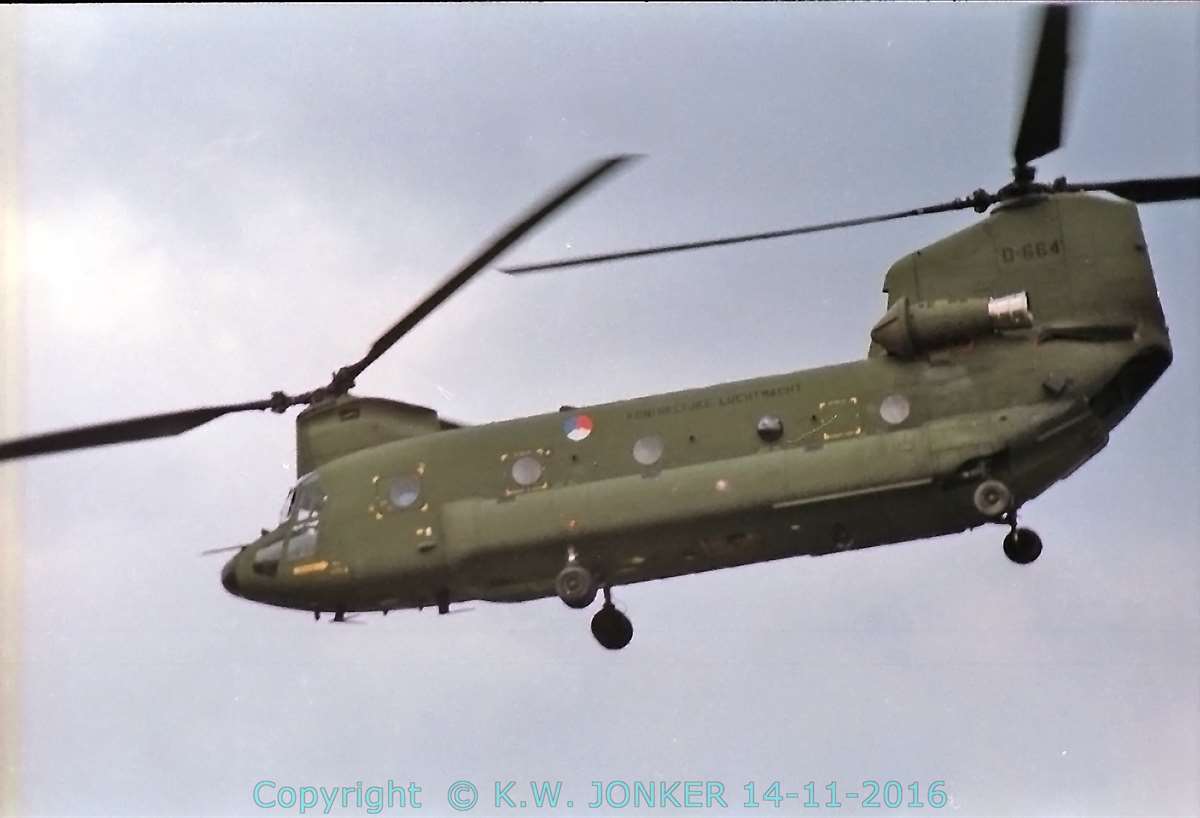
Boeing-Vertol CH-47D Chinook D-664 with the originally mounted deflection plate aft the exhaust (to protect the fuselage because of the more powerful engines used on the Dutch Ch47D) photographed during the Open Day July 1997 at airbase Twenthe.
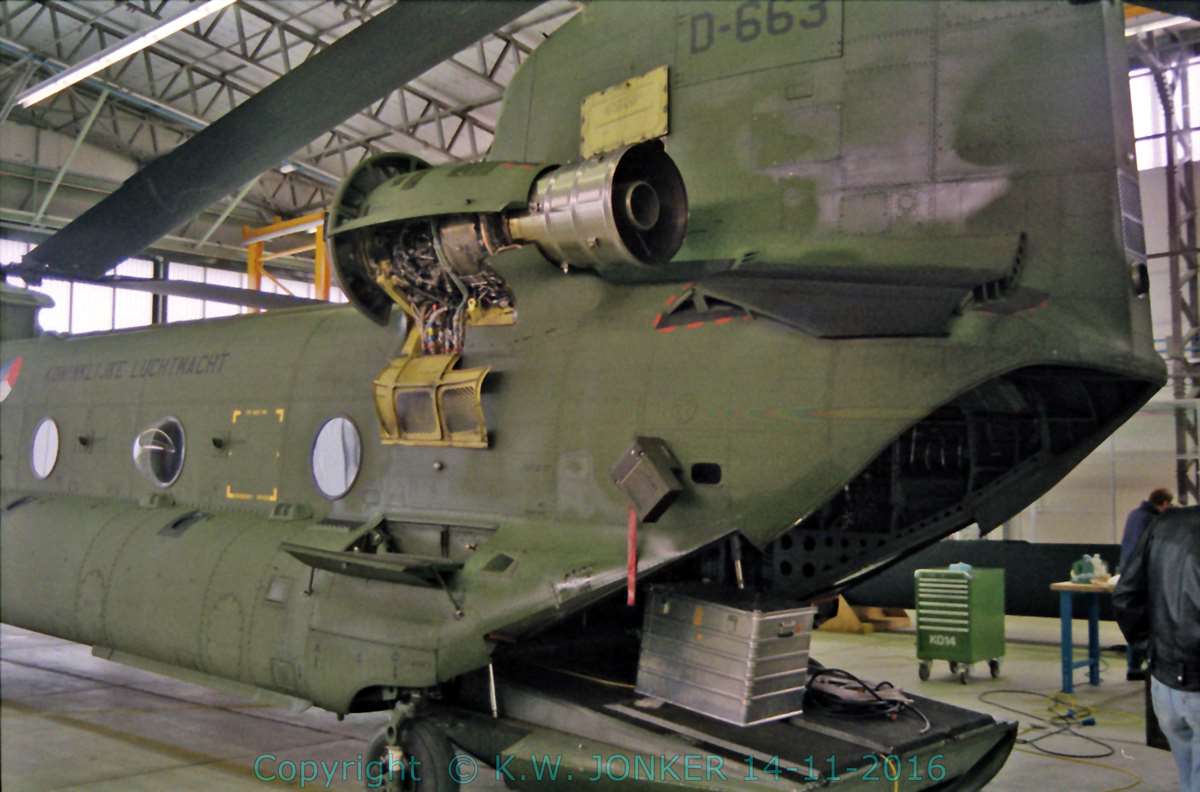
Boeing-Vertol CH-47D Chinook D-663 in the original implementation with the deflection plate aft the exhaust, photographed during a trip to airbase Soesterberg April 1997.
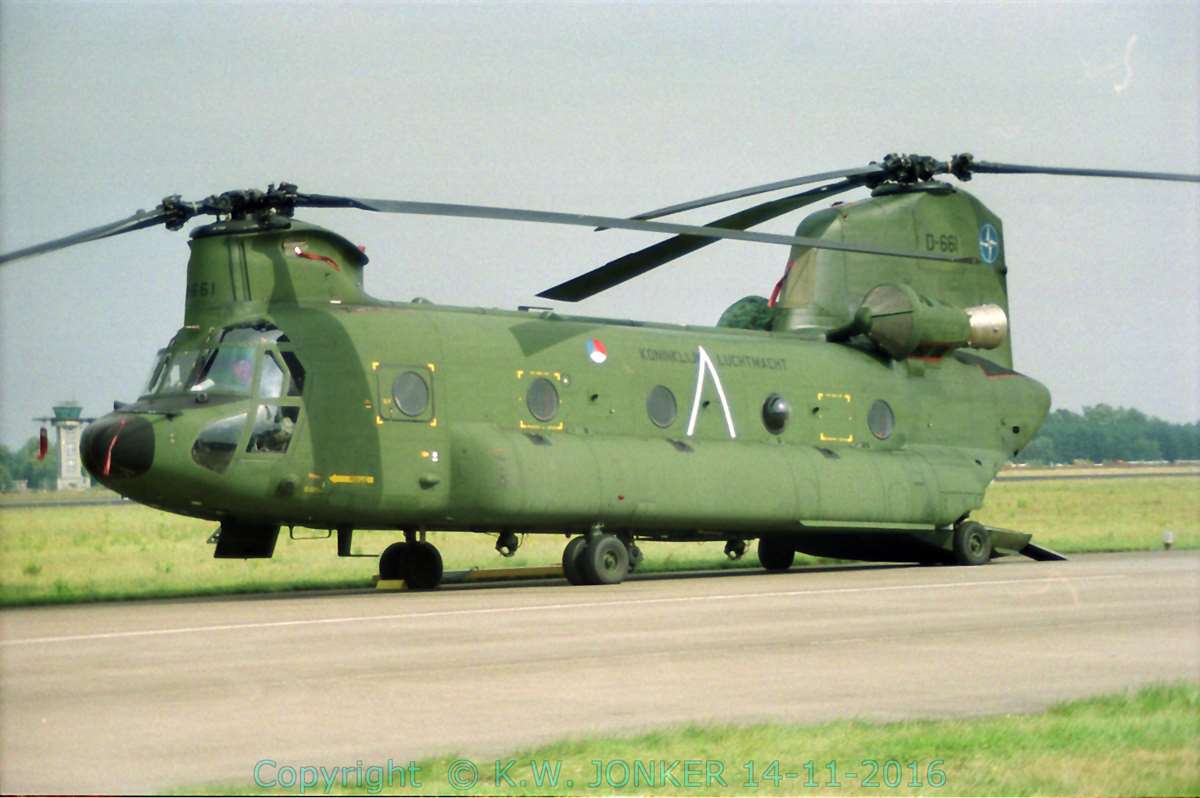
Boeing-Vertol CH-47D Chinook D-661 with UN markings and the slighty outward and upwards pointing exhaust (and omitted deflection plate), photographed during Open Day September 2000 at airbase Volkel.
In 2013 six CH-47Fs entered service as replacement and expansion. Three of these Chinooks are assigned to 302 squadron stationed at Fort Hood in the US for training purposes.
The Chinook is used for wide range of tasks:
- Generic transport
- Transport of injured and humanitarian support
- Search and rescue
- Fire-fighting [using so-called "Bambi buckets' with a capacity of approximately 10,000 l]
- Operations with 11th Air-mobile Brigade.
Secondments
The Chinooks were frequently sent on mission abroad.
KFOR 1999
For this mission three Chinooks were deployed in the Balkans and transported during more than 700 missions relief supplies and refugees.
Allied Harbour 2000
A mission in Albania.
UMEEE 2001
Humanitarian mission in Eritrea.
SFOR Bosnia: 01-2001 - 06-2004
This was a job where initially five Cougars were deployed and later four Chinooks. These operated from Divulje Barracks in Bosnia.
SFIR Iraq: 07-2003 - 11-2005
For this mission, three, and later four Chinooks and four Cougars were deployed from the air base Talil. They were mostly used by the Dutch Peace Force present.
OEF Afghanistan 05-2005 - 06-2006
For this detachment in southern Afghanistan, the aircraft were used by the Dutch special unit forces.
ISAF Afghanistan: 05-2007 - 10-2010
Commitment for the NATO ISAF operation from Kandahar airbase.
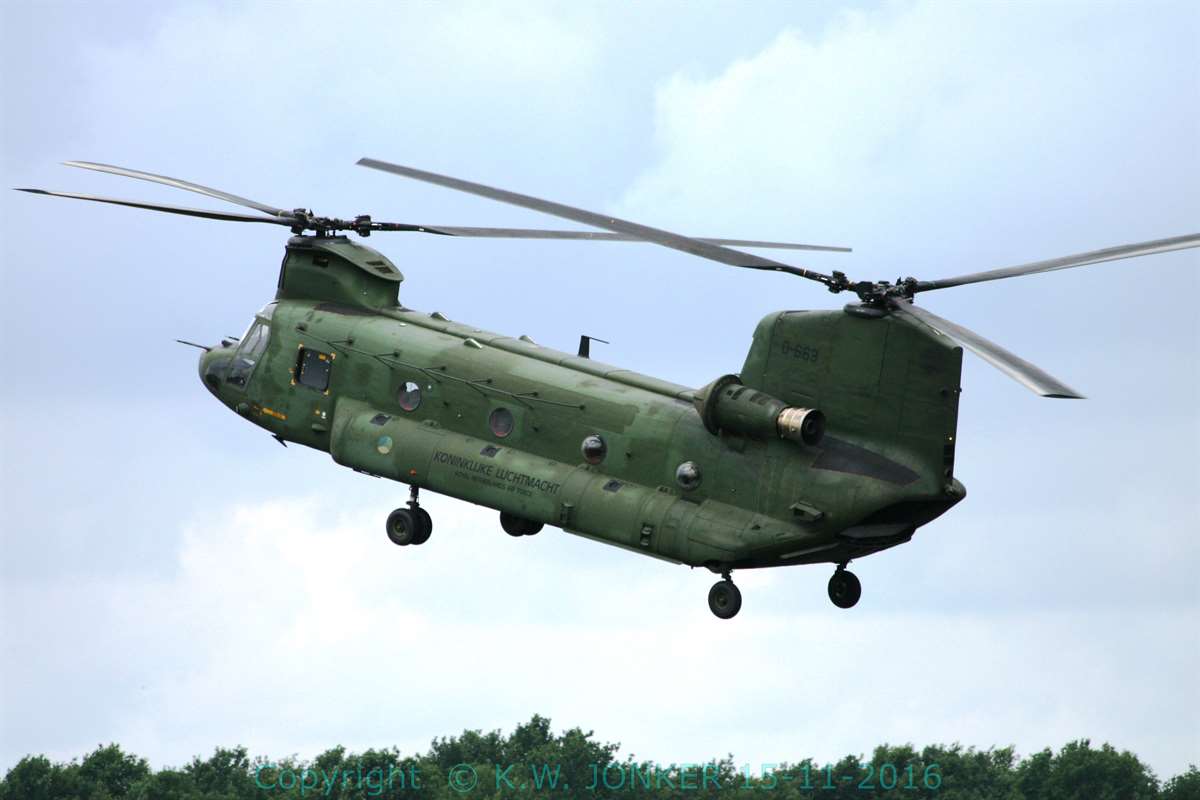
A Boeing-Vertol CH-47D Chinook D-663, with new markings and antennas of the Royal Netherlands Air Force.
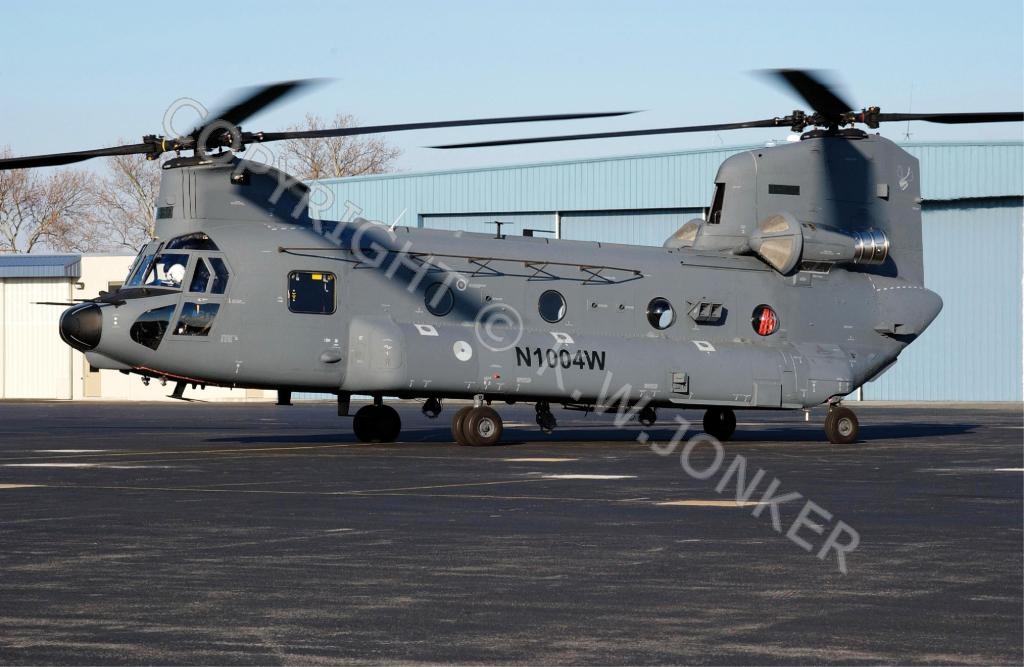
New CH-47F Chinook for the RNlAF at the Boeing Factory (foto via M. Brouwer).
May 2012 the first two new Ch-47F Chinooks were official handed over to the RNlAF, click here
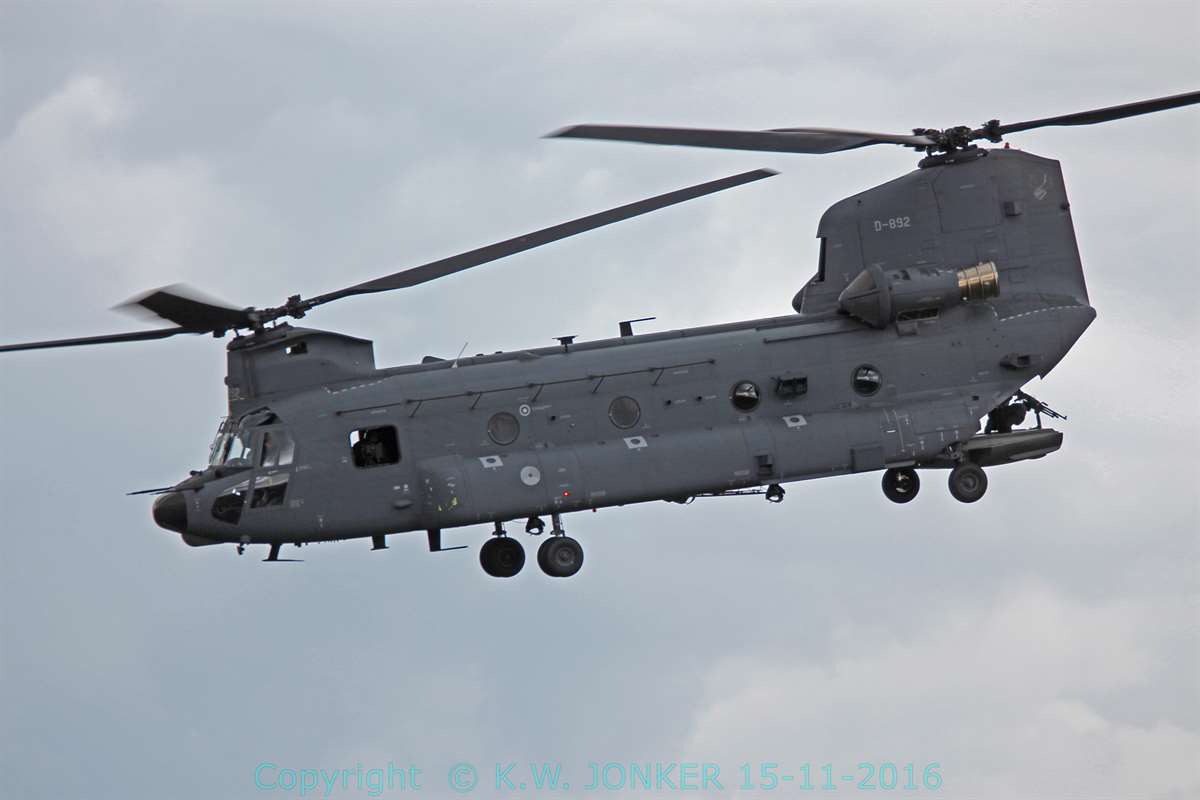
Boeing-Vertol CH-47F Chinook D-892 during the Air Power demo at the Open Day June 2014 at air base Gilze-Rijen.
Boeing CH-47 Chinook
| Serial | Construction nr. | (civil) test serial | Date in service | Date out of service | Nickname | Notes |
|---|---|---|---|---|---|---|
| Ex-Canadian aircraft, which have been revised and overhauled completely | ||||||
| D-661 | M.3661/NL001 | CAN 147003 | 03-08-1996 | Red October' | ||
| D-662 | M.3662/NL002 | CAN 147004 | 05-08-1996 | Lady Liberty' | ||
| D-663 | M.3663/NL003 | CAN 147005 | 08-08-1996 | 'Blizzard' | ||
| D-664 | M.3664/NL004 | CAN 147006 | 29-12-1995 | 'Sling King' | ||
| D-665 | M.3665/NL005 | CAN 147007 | 28-12-1995 | 'Bigfoot' | ||
| D-666 | M.3666/NL006 | CAN 147008 | 30-01-1996 | 'The Beast' | ||
| D-667 | M.3667/NL007 | CAN 147009 | 02-03-1996 | 'Rodney' | ||
| New Boeing built aircraft | ||||||
| D-101 | M.4101/NL008 | N2067F(2) | 29-05-1998 | 'The Philly Connection' | ||
| D-102 | M.4102/NL009 | N2067H | 13-08-1998 | |||
| D-103 | M.4103/NL010 | N2067M(2) | 21-08-1998 | 'Dragon Fly' | ||
| D-104 | M.4104/NL011 | N2069A(2) | 01-10-1998 | 31-10-2005 | Crashed in Afghanistan | |
| D-105 | M.4105/NL012 | N2069S(5) | 05-03-1999 | 27-07-2005 | 'Rainmaker' | Crashed in Afghanistan |
| D-106 | M.4106/NL013 | N7424E(2) | 04-02-1999 | |||
| Serial | Construction nr. | (civil) test serial | Date in service | Date out of service | Nickname | Notes |
|---|---|---|---|---|---|---|
| New ordered Boeing CH-47F Chinook, to supplement and replace lost machines | ||||||
| D-890 | M.8890/NL014 | N1004W | 23-09-2013 | 298 sq Gilze-Rijen | ||
| D-891 | M.8891/NL015 | N1074E | 08-10-2012 | 298 sq Gilze-Rijen | ||
| D-892 | M.8892/NL016 | N1098X | 08-12-2012 | 298 sq Gilze-Rijen | ||
| D-893 | M.8893/NL017 | N1122R | 2013 | |||
| D-894 | M.8894/NL018 | N1149Z | 2013 | |||
| D-895 | M.8895/NL019 | N1154T | 2013 | |||
1/72nd Scale
Kits
- Airfix
- Kit 05035: Boeing Vertol CH47 Chinook HC1 [A release of the Italeri kit 064; For a Dutch Chinook the nose needs to be corrected]
- Italeri
- Kit 045 / 342672: This model has the right radarnose for a Dutch version.
The form of rotor blades however is not correct, especially near the rotorhead and needs to be changed.
Note also the antennas of the Dutch aircraft; during its operational period several changes have been made, check also the exhausts of the enigine.
And further the colour of the Dutch roundels provided with the kit is not correct.. - Kit 064: a model of a standard Boeing CH-47D Chinook (HC1). [For a Dutch Chinook the nose needs to be corrected.]
- Kit 342662:Boeing Vertol Chinook HC1 (CH47C) with a photo Manual
- Kit 045 / 342672: This model has the right radarnose for a Dutch version.
- Matchbox
- Kit PK413: Boeing Vertol Chinook HC.1/CH47D. For a Dutch Chinook the nose needs to be corrected.
- Revell
- Kit 04641:Boeing Vertol Chinook HC Mk1.
Ex-Matchbox kit. For a Dutch Chinook the nose needs to be corrected.
- Kit 04641:Boeing Vertol Chinook HC Mk1.
- Trumpeter
- Kit 01622: Boeing Vertol CH-47D Chinook. For a Dutch Chinook the nose needs to be corrected.
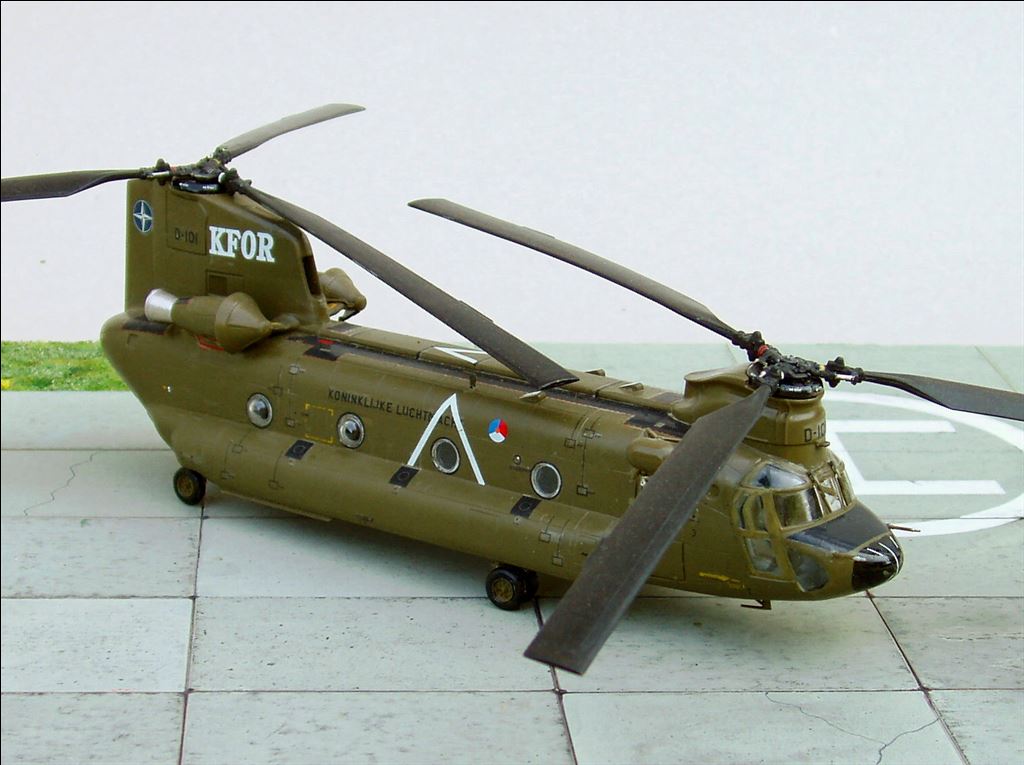
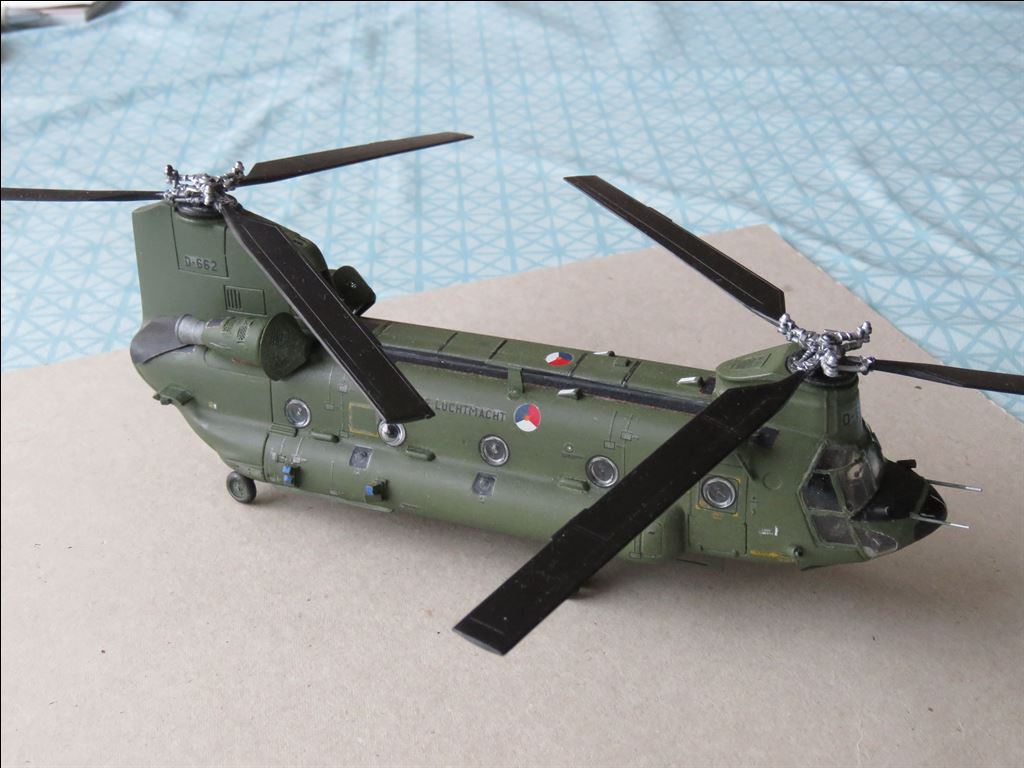
A model vof an early Boeing CH-47D. I used the Matchbox kit and modified the nose, using the nose of the Italeri kit.
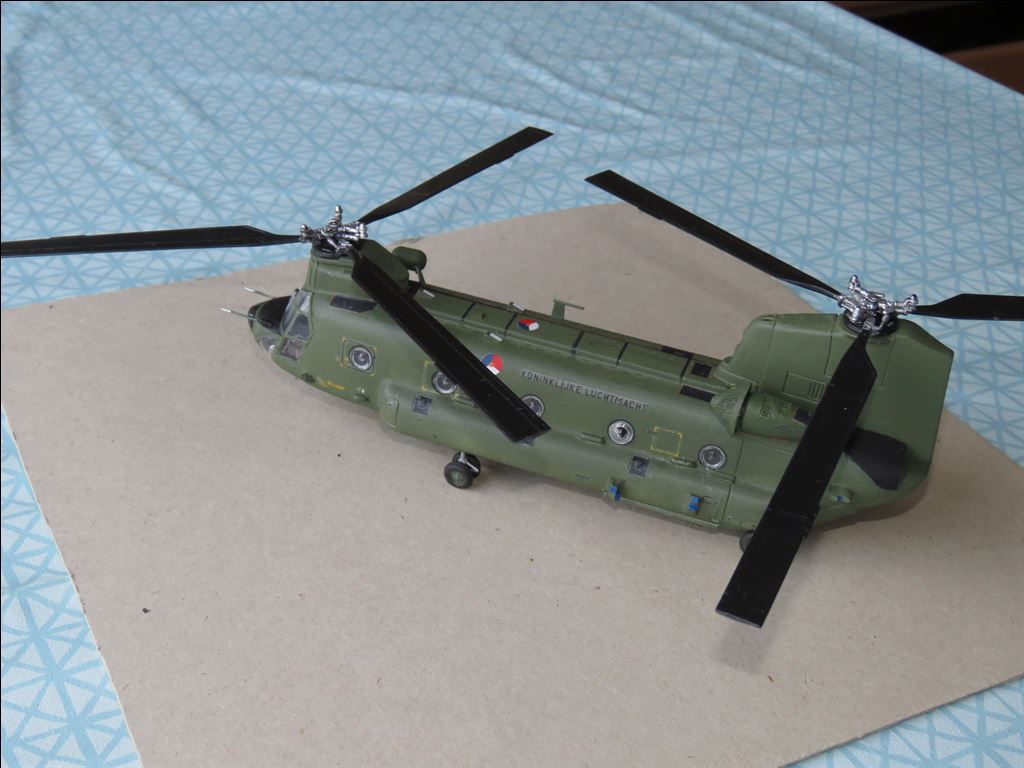
Further is added some antennas and protection plates near the exhaust. Decals used come from the Dutch Decal set 72050 ( a nice set!)
The kit was finished (mainly adding antennas, rotection plates, windows and some decalling plus topcoat) by Adri Kleijn. Thank you very much!!
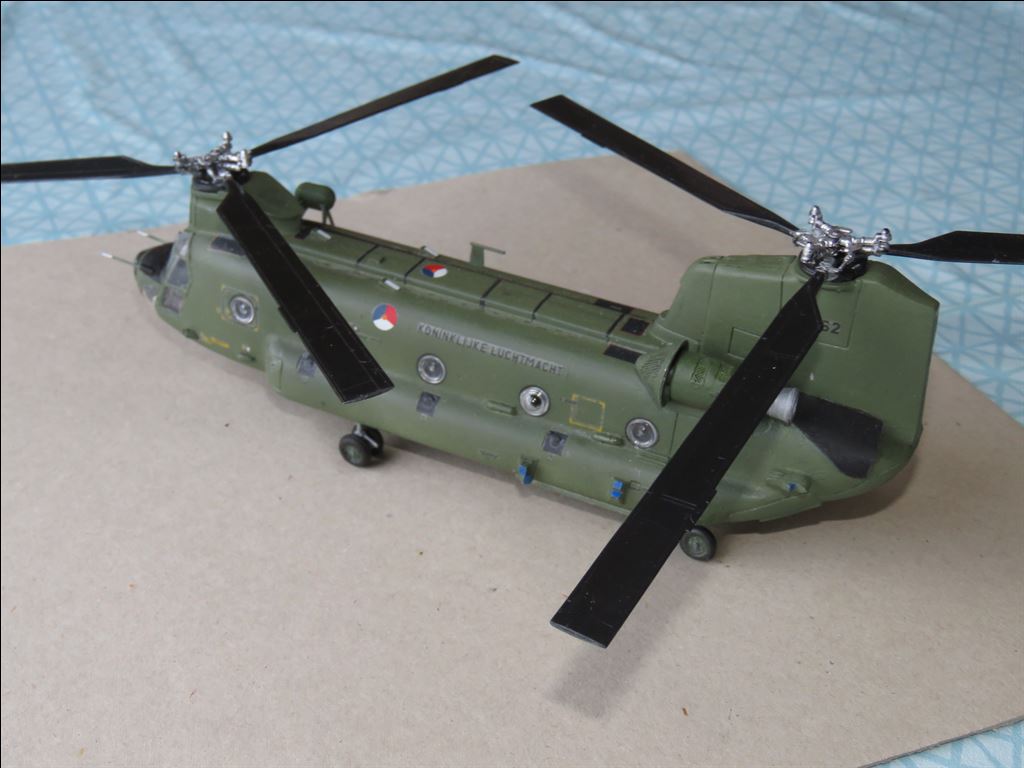
Modelling add-on
- AirWaves
- Kit AC7212: Detailset Boeing Vertol CH47 Chinook
- Eduard
- Set 72-167: Detailset Boeing CH47D Chinook
- Set 72-208: Detailset Boeing ACH47 Chinook
- Set SS314 / 73-314: Detailset Boeing CH47A Chinook Interior self adhesive (Trumpeter)
- Set 73-319: Detailset Boeing CH47 Chinook cargo Seatbelts self adhesive (Trumpeter)
- Set SS 321 / 73-321 : CH47D Chinook Interior - self adhesive (Trumpeter)
- Set 72-455: Detailset MH47E Chinook exterior (delen mogelijk bruikbaar voor CH47D)
- Set 72-486 : Detailset CH47A Chinook Exterior (Trumpeter)
- Set 72-490: Detailset CH47D Chinook Exterior (Trumpeter)
- Set (Big) 7233: Detailset MH47E Chinook (Italeri).
Bevat sets 72-455; 73-278; CX049 - Set (Big) 7248: Detailset CH47A Chinook (Trumpeter)
Bevat set 72-486; 73-008 Remove Before Flight; 73-314; 73-319; CX217 CH-47A paint masks. - Set (Big) 7249: Detailset CH47D Chinook (Trumpeter)
Bevat sets 72-490; 73-008 Remove Before Flight; 73-319; 73-321; CX-226 CH-47D paint mask
- OzMods
- Kit 7202: Conversion set RAAF CH47D Chinook
- CMK
- Kit A7160: Boeing CH47 Chinook Interior Set (Italeri)
- Kit A7161: Boeing CH47 Chinook Engine Set (Italeri)
- Kit A7162: Boeing CH47 Chinook Exterior Set (Italeri)
- Whirlybits
- Kit A72034 : CH47 Chinook replacement composite rotor blades (Airfix-Italeri)
- Model Alliance
- Kit cs-118: CH47 Chinook HC2 Sandfilters
- Kit cs-135: CH47 Chinook HC2 Rotor Blades
- Duarte models
- Kit AC7201: Self Defence Boxes (SH60, SH2, CH47, Lynx, Sea King, Kiowa)
Decals
- Dutch Decal
- Set 72050: Contains serials for each aircraft of 298 squadron, including names, UN and KFOR markings plus things like walkways etc. (for one aircraft).
1/48th Scale
Kits
- Italeri
- Kit 342647: Boeing Vertol ACH47A Armed Chinook Italeri 342647 Boeing Vertol ACH47A Armed Chinook
- Set 342672: Boeing Vertol CH47D Chinook
Modelling add-on
- CMK
- Set 4203: Boeing CH47 Chinook Interior set
- Set 4204: Boeing CH47 Chinook engine set (Italeri)
- Set 4218: Boeing CH47 Chinook Interior set (Italeri)
- Set 4219: Boeing CH47 Chinook Rear Fuselage roof interiorset (Italeri)
- Eduard
- Set (Big) 4885 : Detailset AHC47A Chinook (Italeri)
Setjes 48-558; 49-037; 49-355; X199 ACH-47A Chinook paint mask - Set (Big) 4906: Detailset CH47C Chinook HC1 (Italeri / Revell)
Setjes: 48-600; 48-601; 49-009 Remove Before Flight; 49-421; 49-422; X248 CH-47C/HC-1 Chinook mask - Set 49-037: Detailset ACH47 Chinook seatbelts (Italeri)
- Set 49-421: Detailset Boeing CH47C/HC1 Chinook Interior Self Adhesive (Italeri)
- Set 49-422: Detailset Boeing CH47C/HC1 Chinook Cargo and seatbelts Self Adhesive (Italeri)
- Set 48-355: Detailset ACH47A interior
- Set 48-558: Detailset ACH47A
- Set 48-600: Detailset CH47D/HC1 Chinook Cargo Interior (Italeri)
- Set 48-601: Detailset CH47D/HC1 Chinook Exterior (Italeri)
- Set (Big) 4885 : Detailset AHC47A Chinook (Italeri)
- Heritage Aviation
- Set CV48019 : RAF CH47 Chinook HC1 Rotor Bladen
- Italeri
- Set 3426002 : CH47 Chinook Detailset Italeri
Decals
- --
- Set --: --
| Scheme | Colour name | FS number | RAL | Humbrol | XtraColor | Vallejo Model Color | Vallejo Model Air | Revell (36 = acryl; 32 = enamel) | Hataka | |
|---|---|---|---|---|---|---|---|---|---|---|
| Standard #1 | Overall | Olive Green | 34094 | 6031 | 117 | X116 | 70.975 ?? | 71.250 | 32362 / 36362 | ~152 |
| Standard #2 [CH-47F] | Overall | Grey | 36320 | 128 | X258 | 70.830 | 71.120 | ~035 | ||
| Markings | Light grey | 36375? | 127 | 70.989 | 71.046 | 32176 / 36176 | ~034 | |||
Check www.paint4models.com for an extensive conversion table with lots of colour and paint systems.
The Ch-47F is officially overall FS 36118, but in the real world this colour looks far to dark. FS 36320 is a better match for the colour applied on the CH-47F
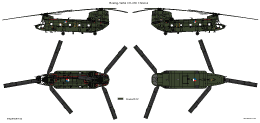
Note the protection near the exhaust of the more powerful engines.
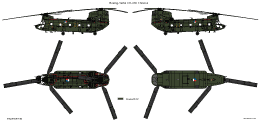
The protection plate has been omitted s the exhausts have ben repositioned and are pointing more upwards and outwards. Later retrofitted to the first series.
Further the antennas and markings have changed.
Literature.
| Aerofax Minigrapoh 27: Boeing Helicopters CH-47 Chinook | David Anderton & Jay Miller | 1989 | Uitgever Aerofax, Inc., Arlington, Texas | |
| Luchtvaart; 10e jaargang nummer 10: Nederlandse Luchtmacht krijgt Boeing CH-47 Chinooks | Hans Heerkens | Pag. 344 - 351 | 1993 | Uitgeverij Ten Brink, Meppel |
| Squadrons van de Koninklijke Luchtmacht (derde herzien druk | Willem Helfferich | pag. 67 - 68 | 1994 | Uitgever Uitgevers Wyt, Rotterdam |
| Modelbouw in Plastic jaargang 26, nummer 1: Boeing Vertol CH-47D Chinook | Erwin Stam | Pag. 20 - 22 | 1997 | I.P.M.S. Nederland, Nederland |
| Camouflage en Kentekens | J.Greuter e.a. | 1997 | Bonneville – Bergen (NH) |
Websites.

